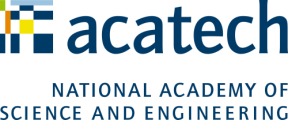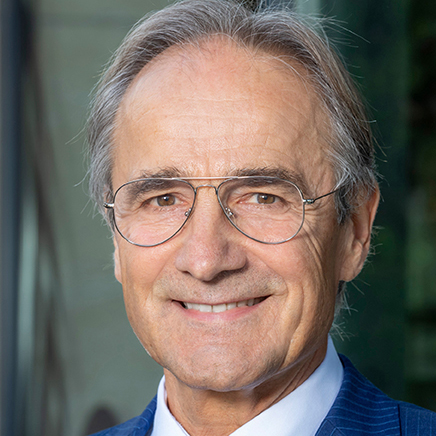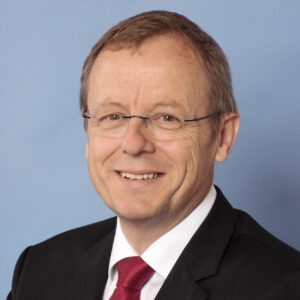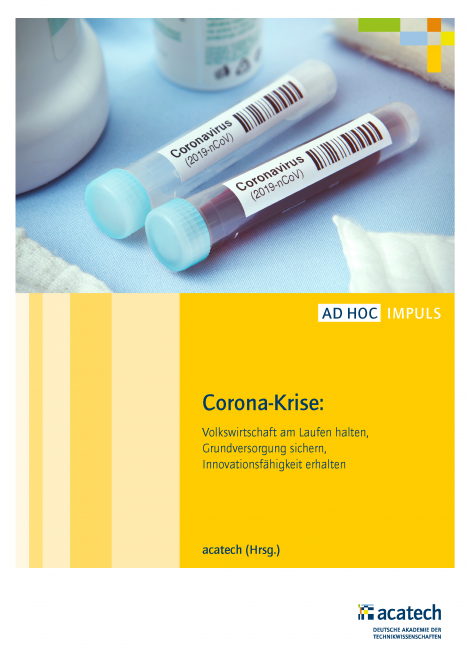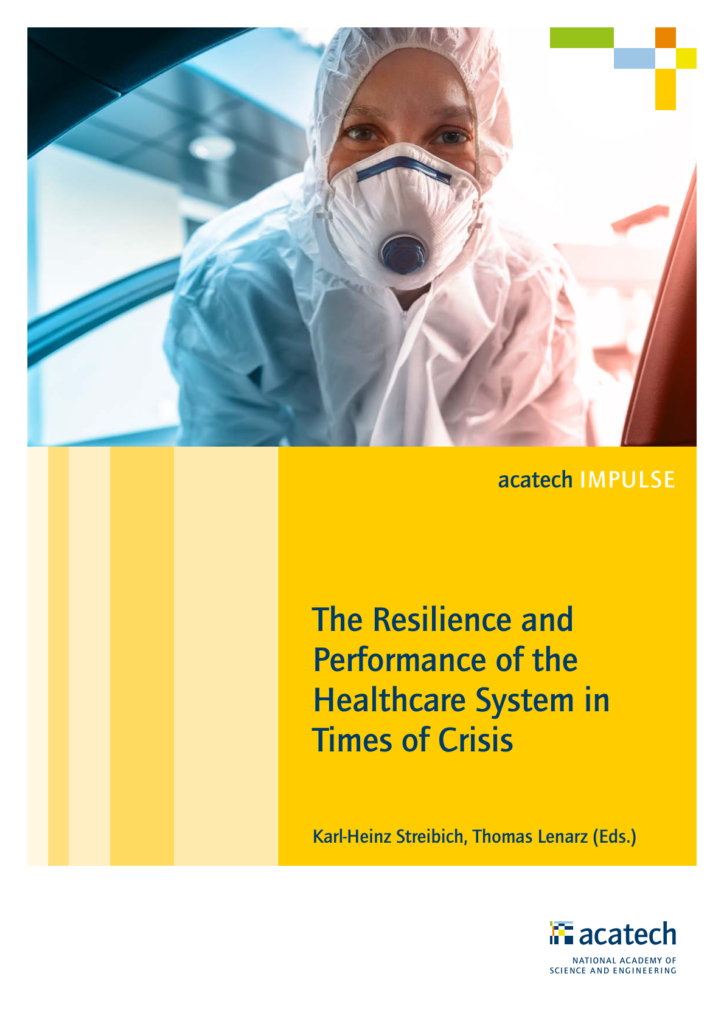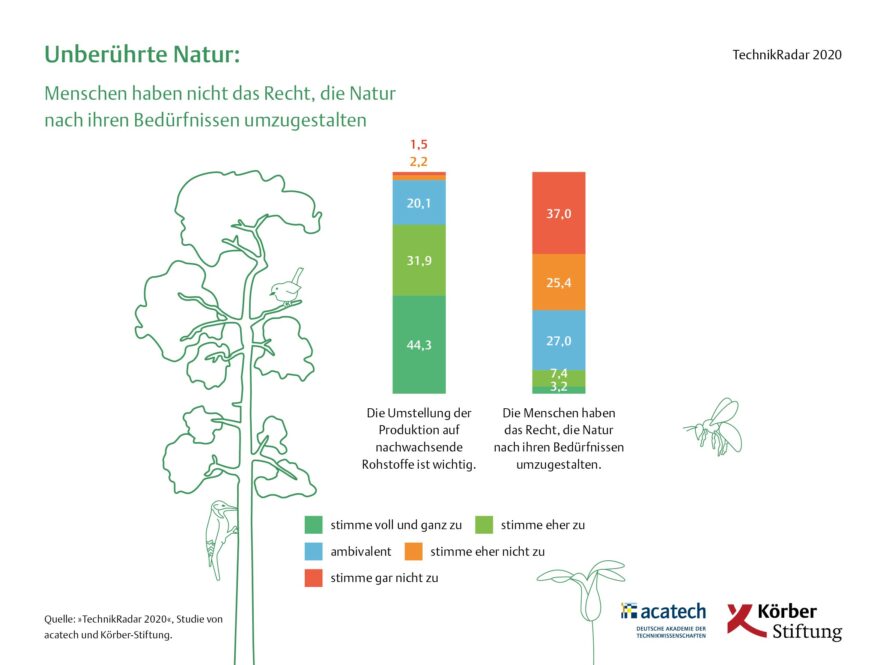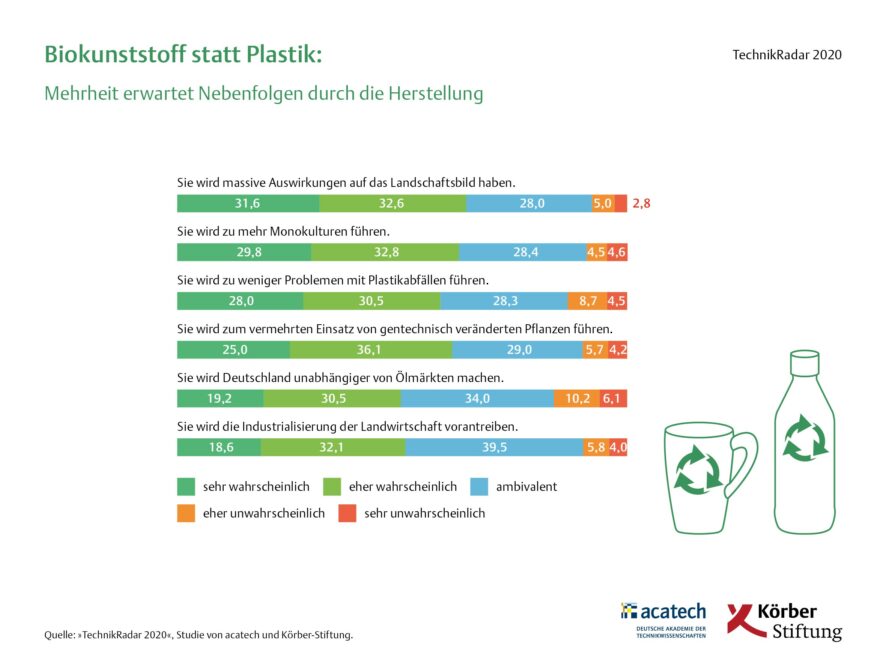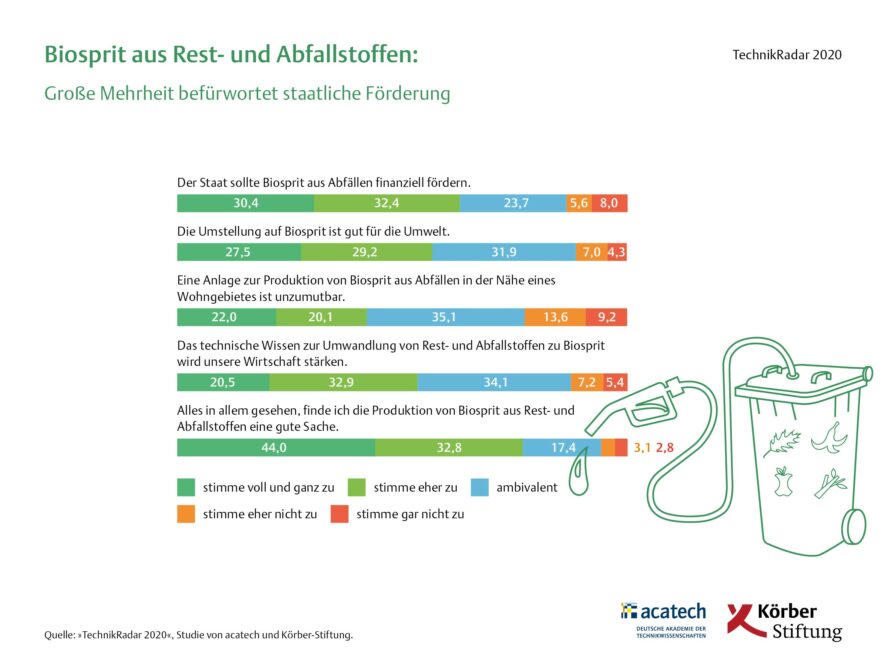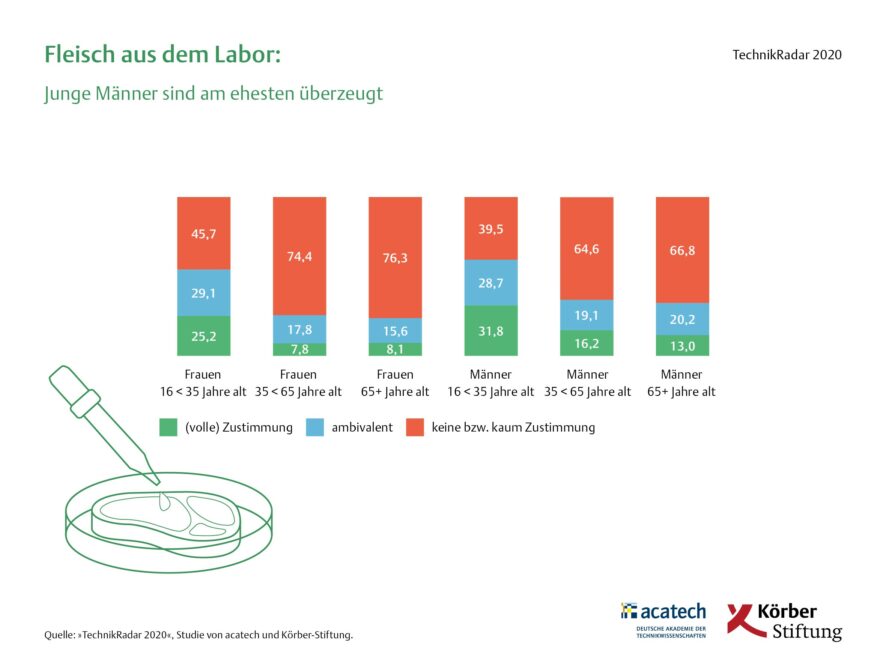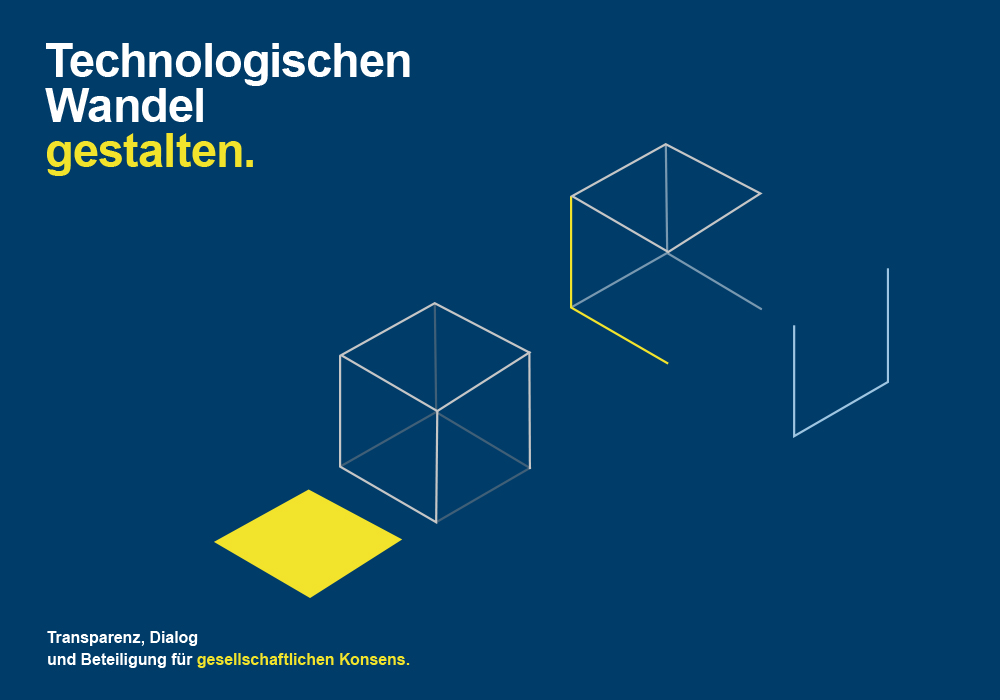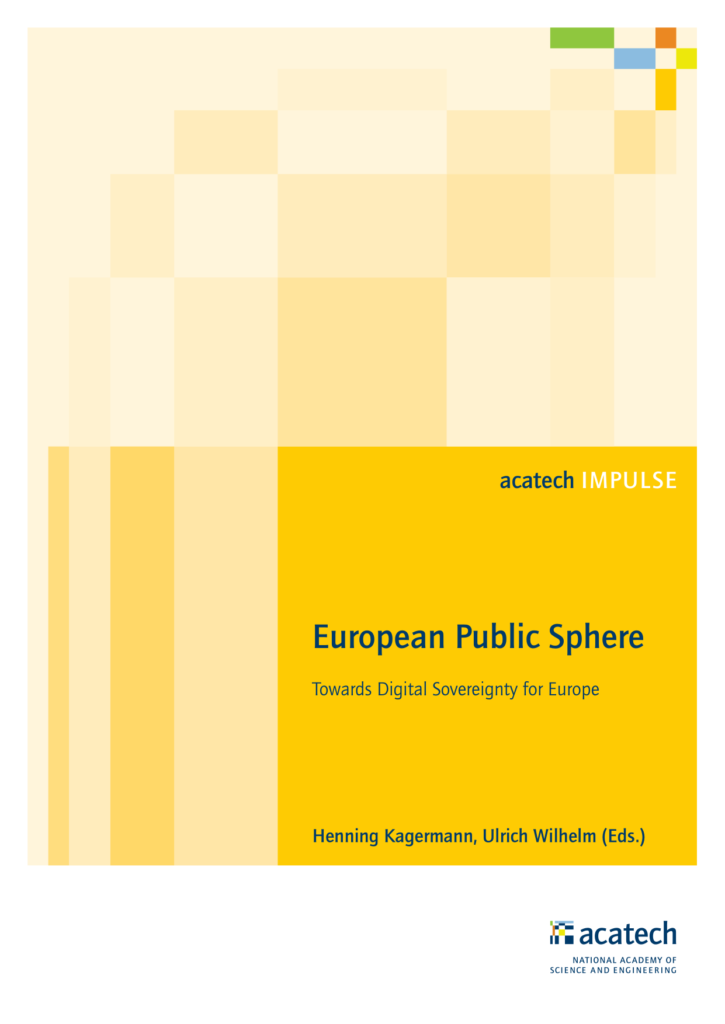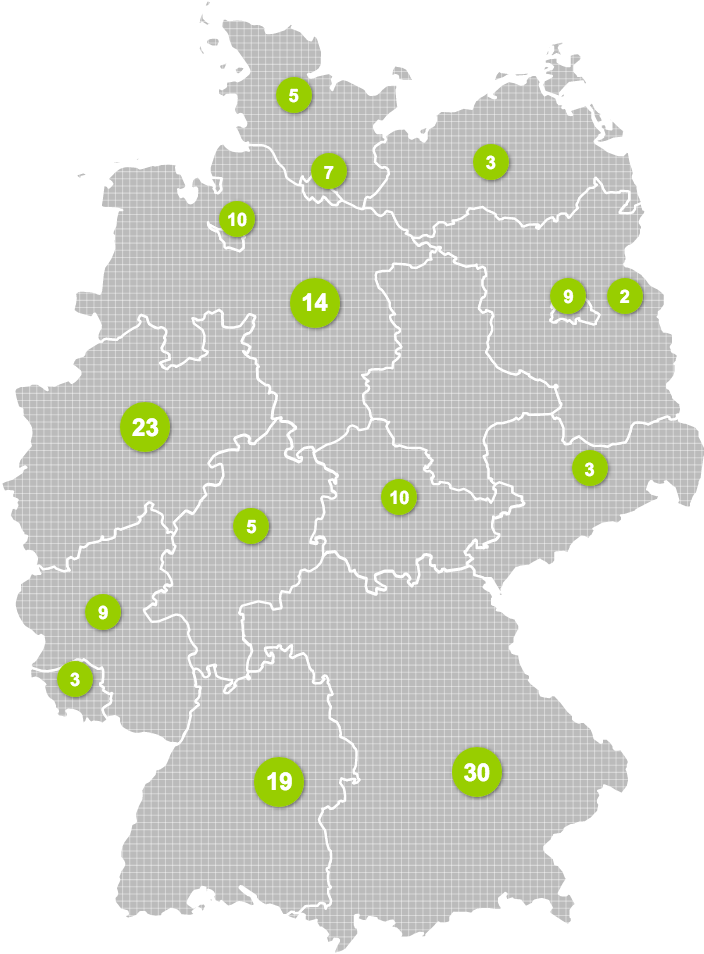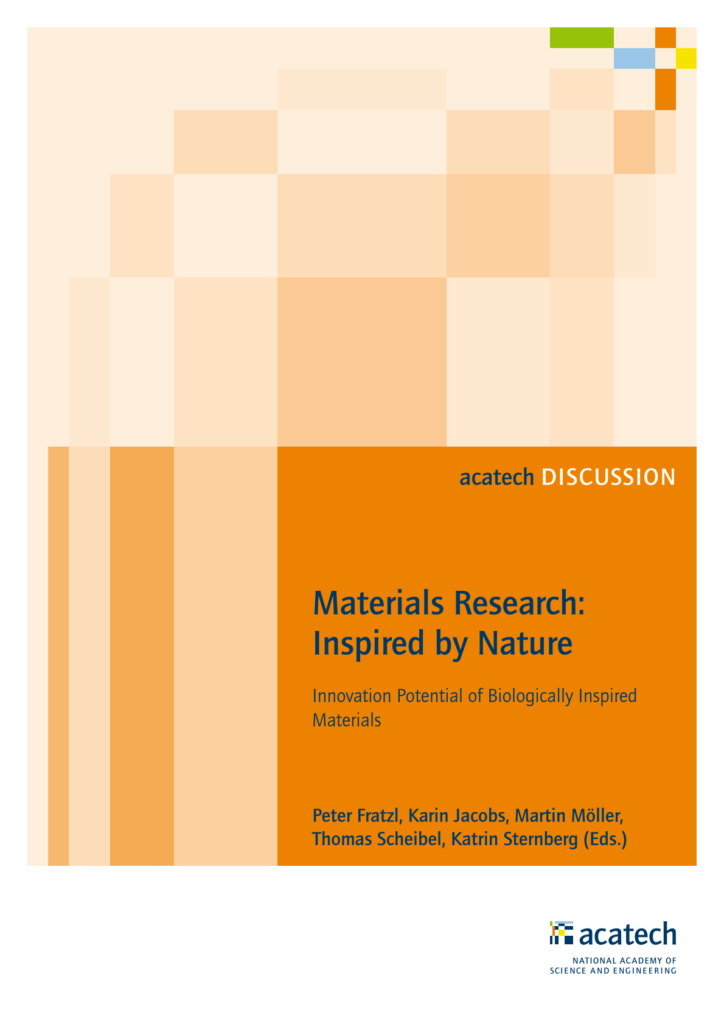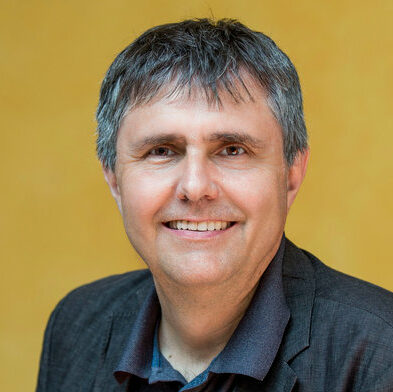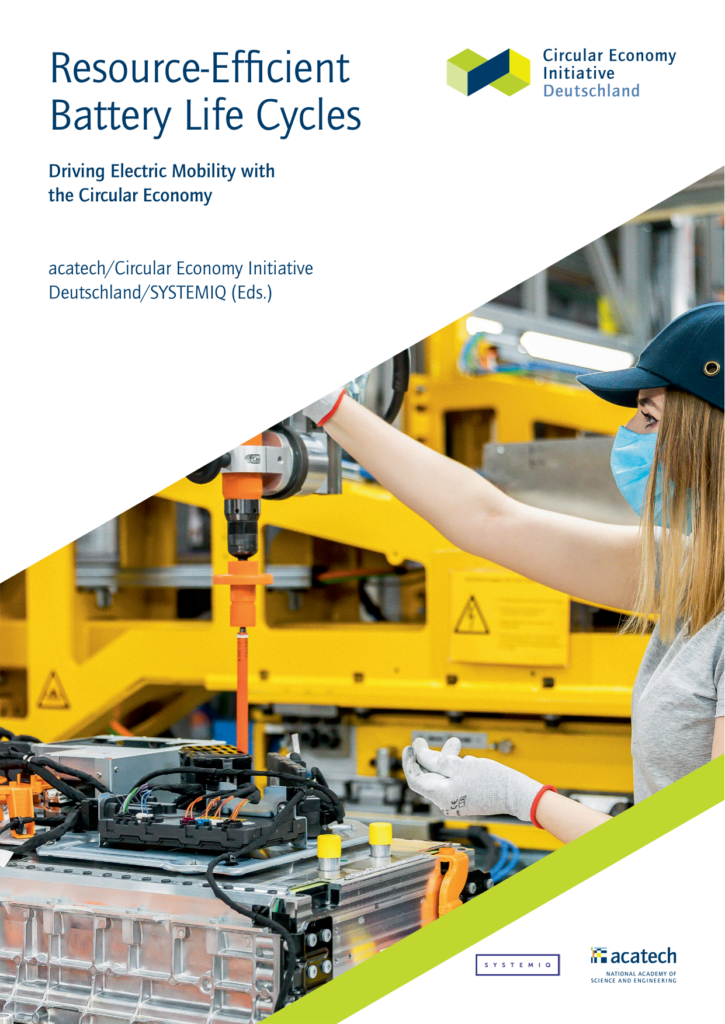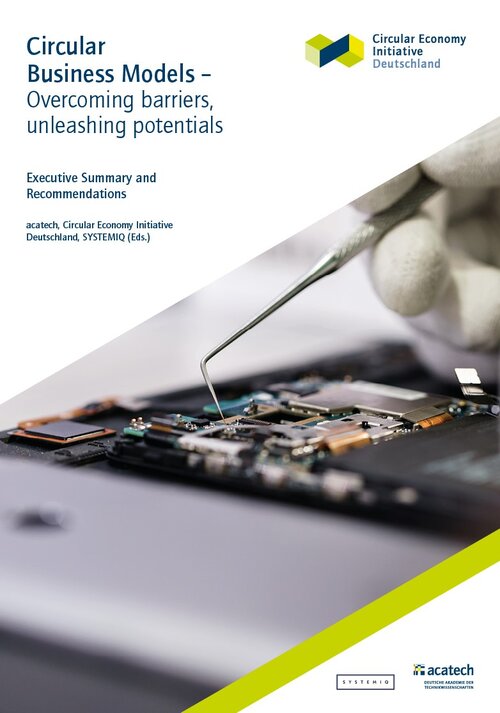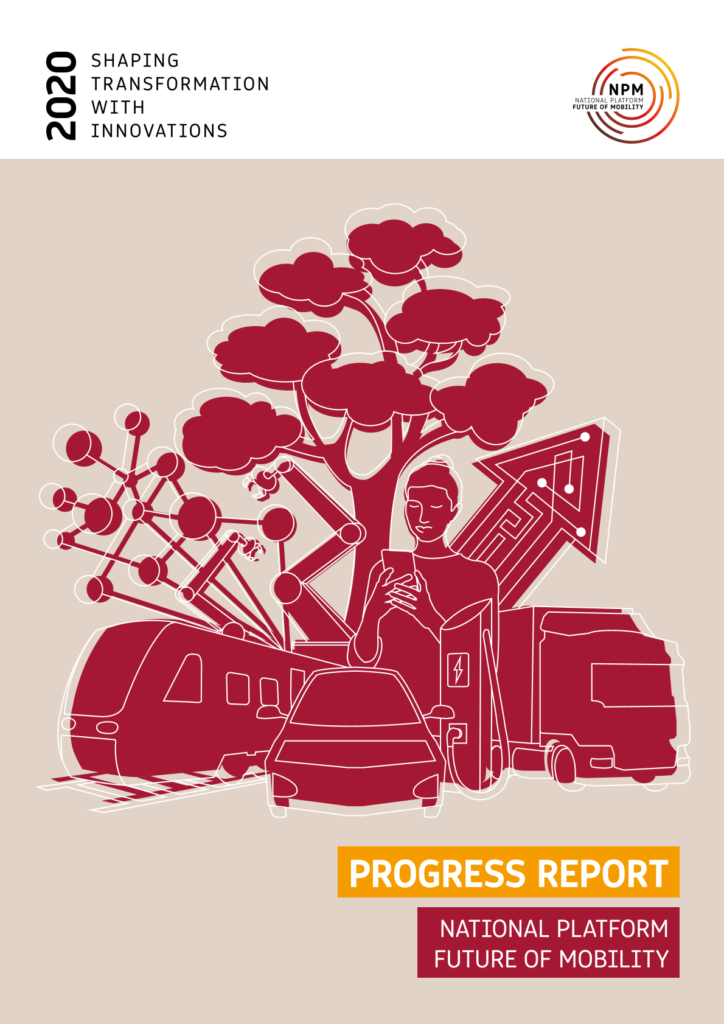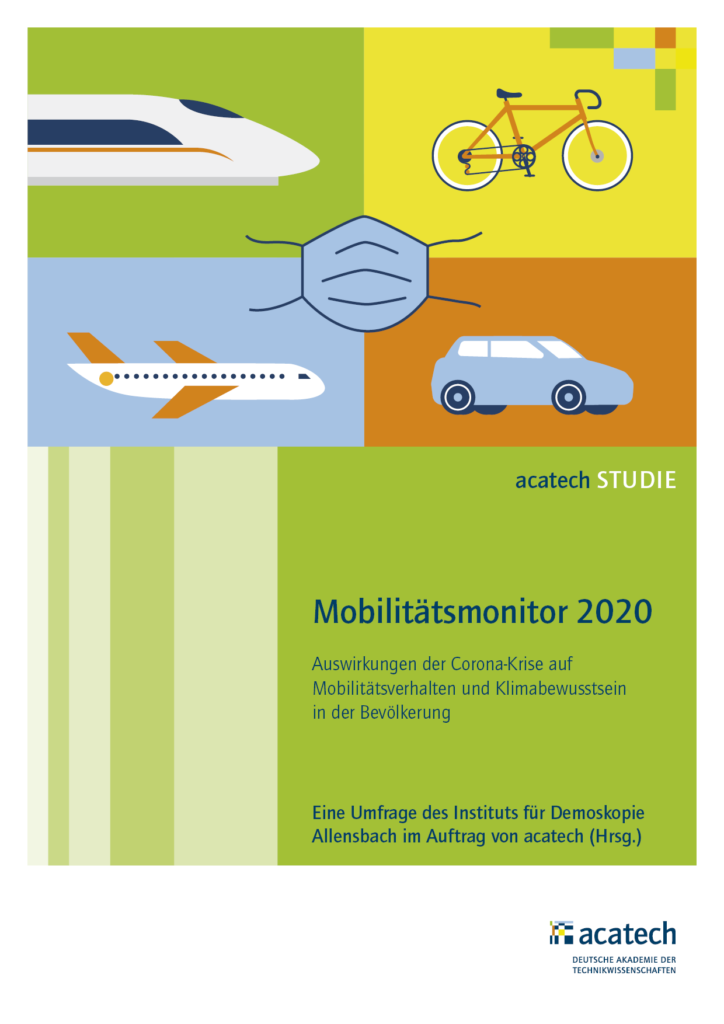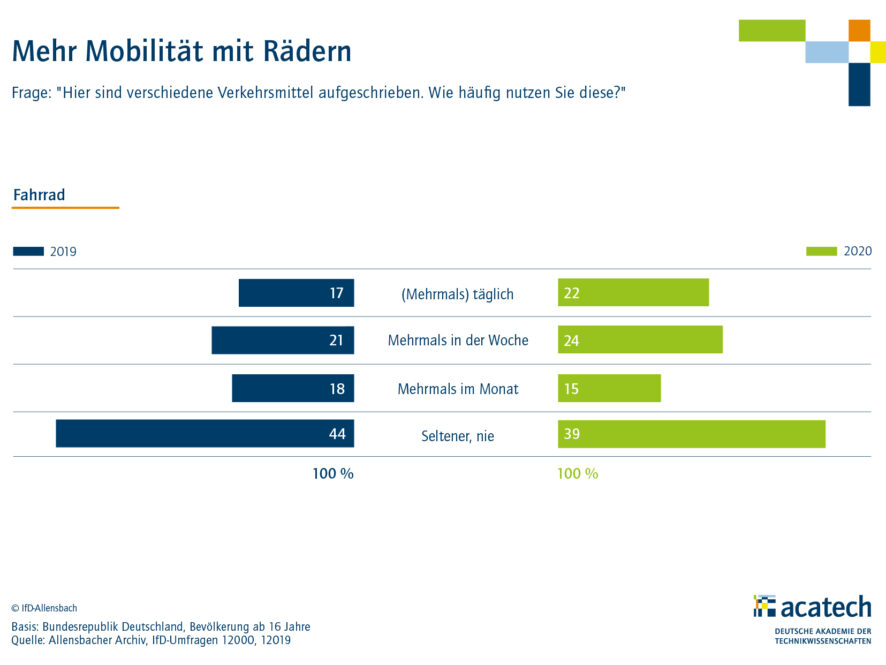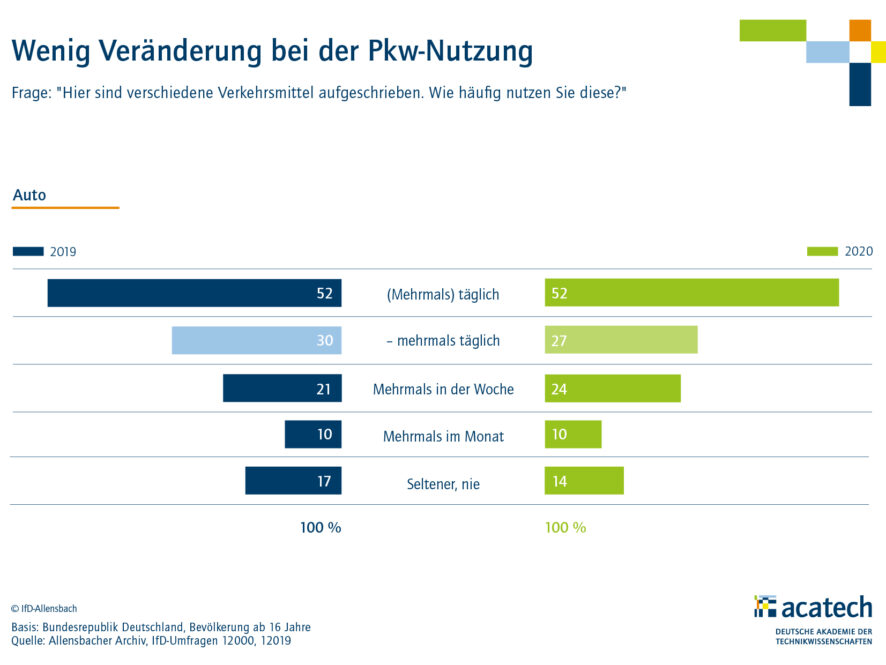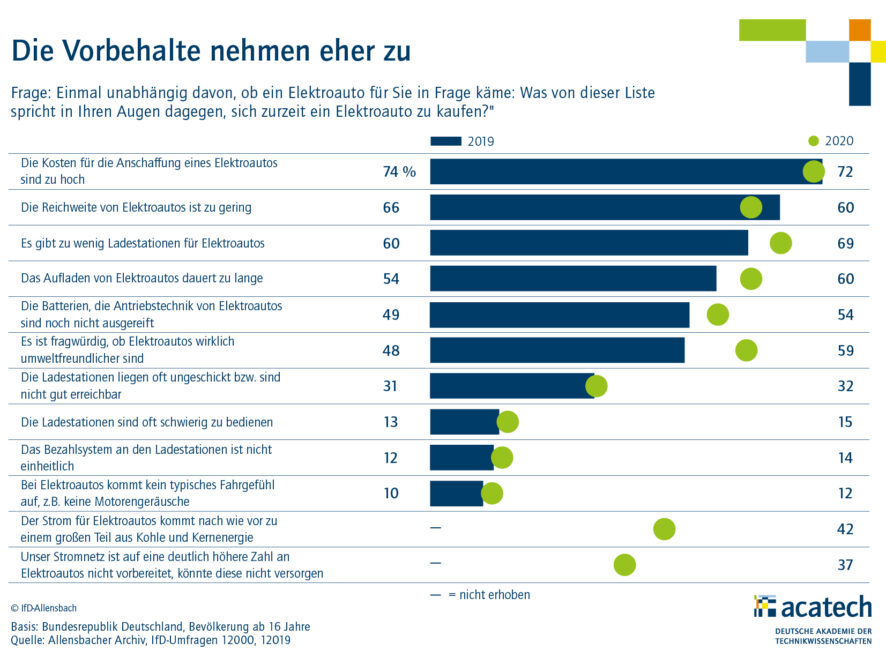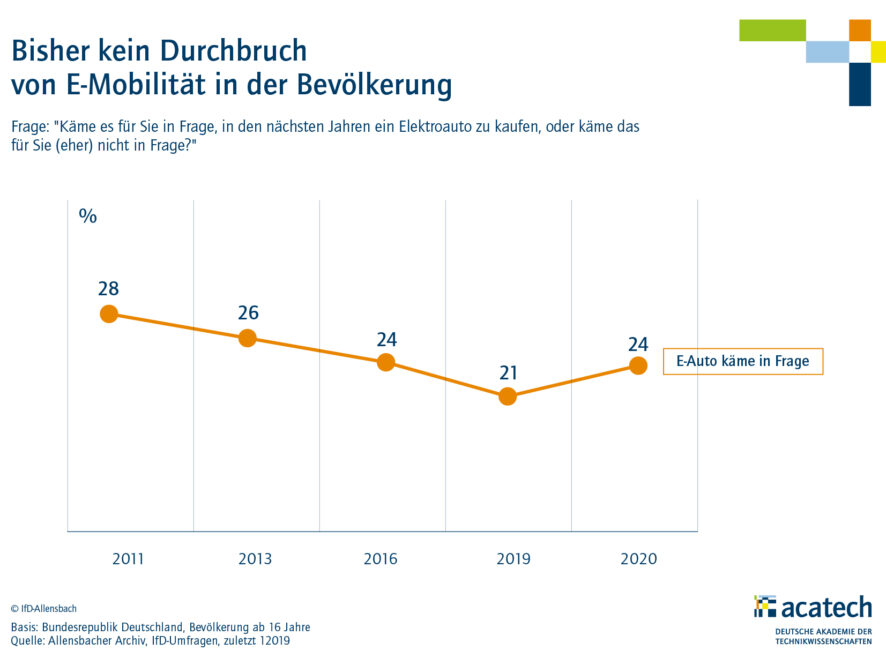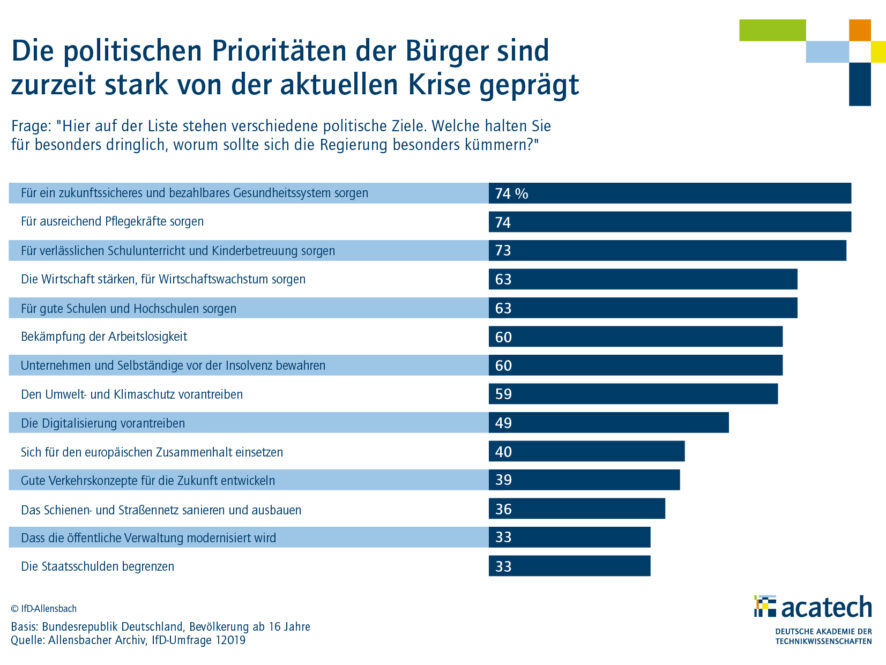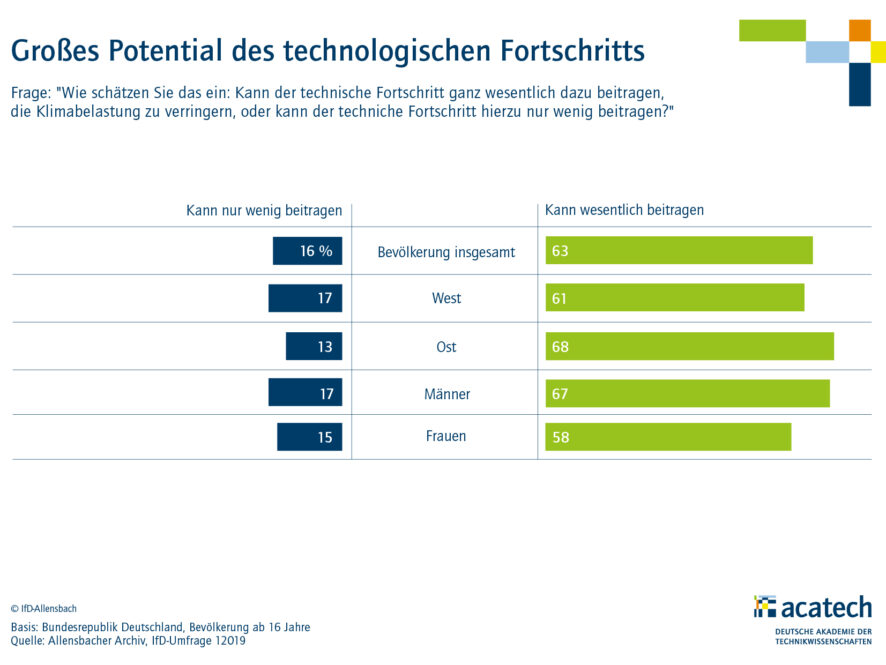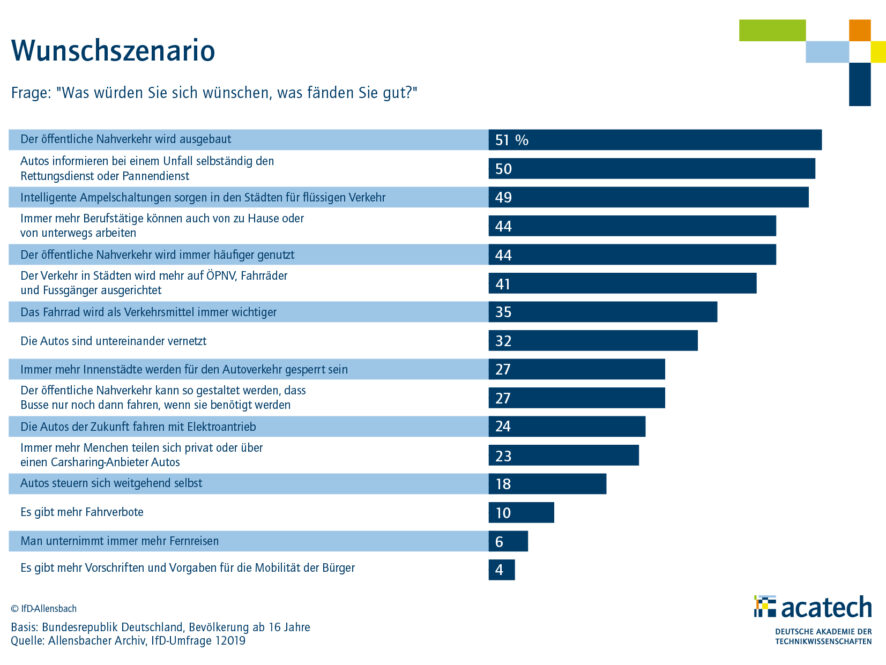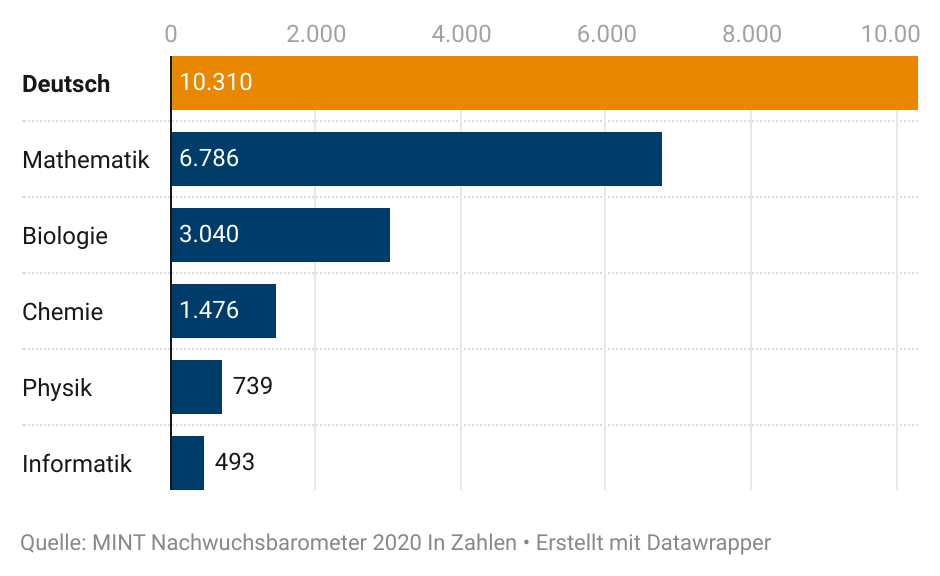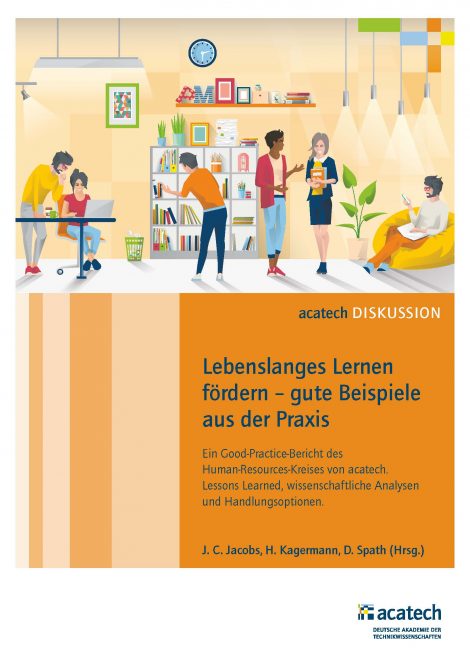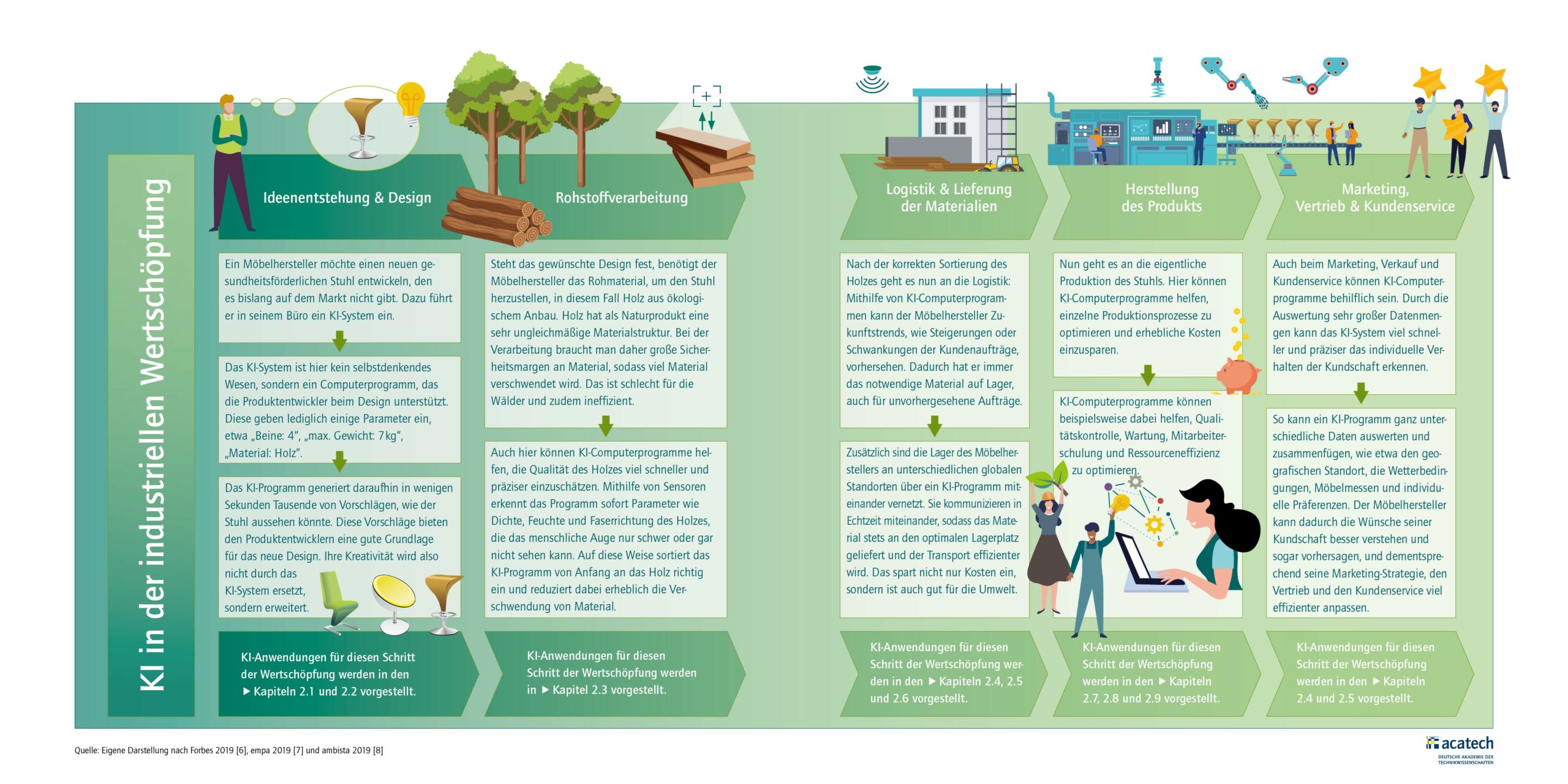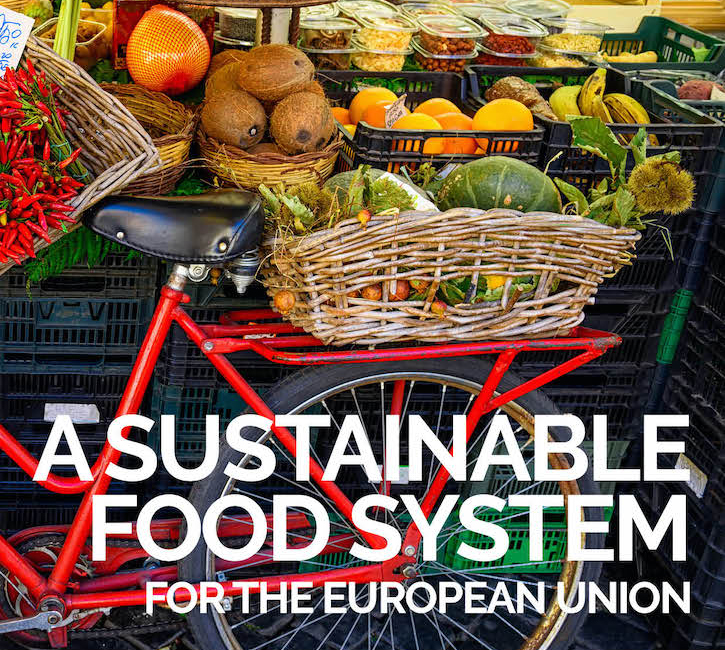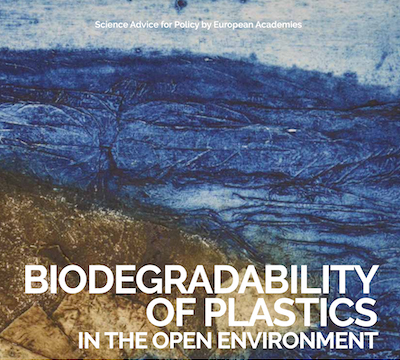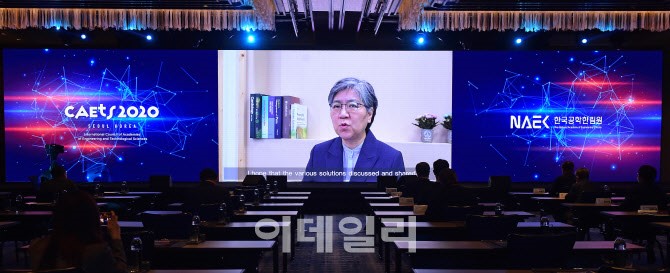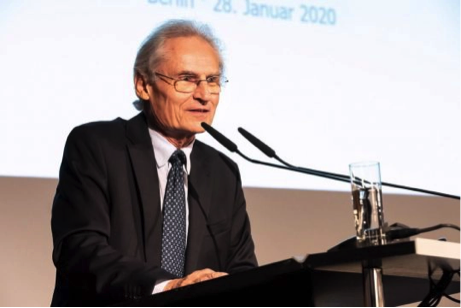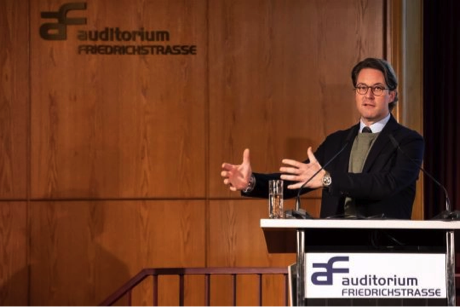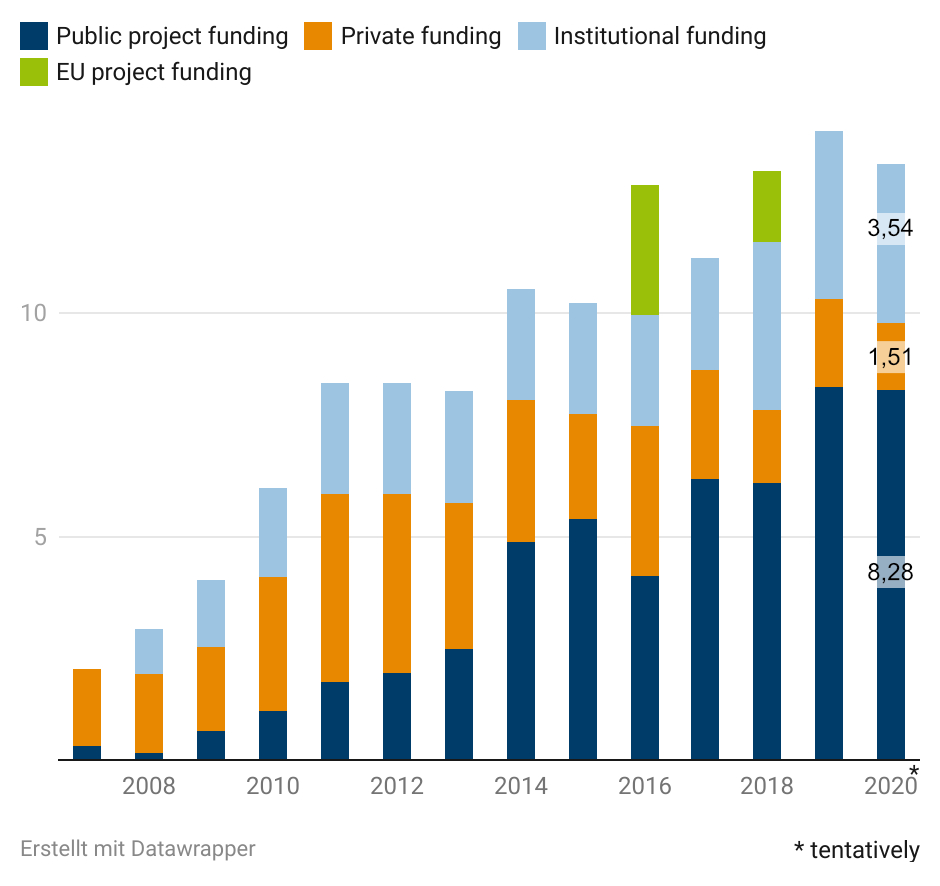At the start of the first lockdown in March 2020, a working group led by acatech Executive Board member Christoph M. Schmidt warned that we will be dealing with the crisis caused by the pandemic for a long time to come – there is no rapid exit strategy. The main focus of our first Impulse publication on the coronavirus crisis was on widespread testing, nuanced public health measures, the stabilisation of the economy and public life, and stimulating long-term growth. In our subsequent publications on the coronavirus crisis, we have made the case for using innovative technologies to strengthen resilience at several different levels.
While the coronavirus crisis has driven change, it has also exposed a number of weaknesses. Germany and the rest of Europe were poorly prepared in many areas, from schools to business and public administration. Change is key to achieving stability and a prudent “new normal” in any crisis, not just the coronavirus pandemic. The importance of freedom of choice and autonomy in the use of new technologies has also become apparent, especially in the digital transformation. acatech has produced a publication setting out how the abstract goal of digital sovereignty can translate into concrete strategies. To address the challenges facing the world today, we must find a way of enabling the human pursuit of self-fulfilment, prosperity, freedom and security without harming the climate and environment. While first-rate research and proactive businesses are both key to making this possible, they are not enough on their own – innovation is a collective endeavour.
That is why we bring science, industry, government and civil society organisations together around the same table in the Innovation Dialogues and in platform projects on the future of mobility, the energy systems of tomorrow and the future of artificial intelligence. In 2020, we embarked on an initiative to explore new ways of communicating about technology. The aim is to identify forms of communication that strengthen transparency, dialogue and public participation and make it possible to build a stable social consensus.
We would like to thank our highly committed Members and Senate members, along with everyone who has contributed to acatech’s work during this challenging year. We would also like to say another very personal thank you to Dieter Spath, who guided acatech with a sure hand during his time as one of the Academy’s two Presidents.
There has been tremendous interest in our work, and we thank everyone reading this report for taking the time to learn about we are doing. We hope you enjoy reading the report and welcome any feedback you may have.
Munich and Berlin, July 2021
Resilience in the coronavirus crisis
At a time when health has been at the forefront of our minds, acatech has been providing the German government with advice on its measures to protect public health ever since the start of the crisis. Even in March 2020, an acatech task force warned that lifting the restrictions too soon would lead to a new wave of infections. The Academy’s experts stressed that a comprehensive vaccination programme would be needed to bring the virus under control, but also emphasised the importance of preventing a complete shutdown of economic and social life
Shortly after the country went into lockdown, a working group led by Christoph M. Schmidt (President of RWI – Leibniz Institute for Economic Research in Essen and acatech Executive Board member) published an acatech IMPULSE that formulated strategies for tackling the crisis based on three key action areas: intervention (supporting the healthcare system, mitigating the impacts of lockdown), stabilisation (especially of industries that provide basic necessities) and stimulation to enable future recovery. The publication stressed the importance of resilience – the resilience of our healthcare system, infrastructure, economy, public administration and indeed of our free, democratic society. Despite the current restrictions, it is vital for all these elements to keep functioning as reliably as possible, adapt to the new reality, and recover as quickly as possible when the time comes.
During the following months, the Academy’s experts explored the impacts of the pandemic, technological options for strengthening resilience at this time of crisis, and ways of making a virtue out of necessity by driving effective modernisation over the longer term. Technology is helping to mitigate the impacts of the crisis in almost every area of private, economic and public life. Examples include remote working and learning, digital applications in the field of medicine, and technological solutions for maintaining a stable food supply.
Overview of the Academy’s publications
A regularly updated overview of the Academy’s publications on this topic is available at www.acatech.de/corona. The Plattform Lernende Systeme, which is coordinated by acatech, describes various ways in which AI is helping to tackle the crisis on its KI vs. Corona (“AI vs. Covid”) page.
acatech maintains that digital connectivity can make a particularly significant contribution to strengthening resilience by facilitating remote working, learning and private contact. Digital platform providers are experiencing unprecedented growth. Throughout industry and the public sector, it is apparent that the companies, organisations and institutions that have coped best with the crisis are those that had already digitalised their activities before its onset or have been quick to adapt to the new situation. An acatech IMPULSE presents 10 inspiring examples of resilience pioneers in Germany who have added concrete value for their customers and business partners by integrating digital infrastructure, technologies and services.
A team of authors led by Thomas Lenarz (Hannover Medical School) and acatech President Karl-Heinz Streibich showed how the healthcare system can become more resilient and also more efficient. They asked what lessons can be learnt from the current crisis and what improvements are needed in order to strengthen the healthcare system’s resilience while also improving its performance. The experts’ recommendations include the introduction of a common European digital reporting system for health data. They argue that the availability of real-time infection data is key to ensuring that the right measures are taken to protect public health
acatech continues to stress the importance of resilience – the resilience of our healthcare system, infrastructure, economy, public administration and indeed of our free, democratic society. It is thus vital to build trust through good communication between government, science and the general public:
If information about a crisis like the current pandemic is to be deemed trustworthy, it should be presented as clearly as possible, be scientifically validated, and be free from any party political or vested interest agendas. This is particularly true when communicating information that is uncertain.
Ortwin Rennacatech Executive Board
in his article on good communication in times of crisis
Publications
News items
- Dialogreihe #DIGITALESHESSEN: Corona – Turbo oder Bremsklotz für Startups? *
- incrisia – spielerisch zu mehr Demokratieverständnis in Krisenzeiten *
- Digitale Lehre in Zeiten von Corona *
- Dialogreihe #DIGITALESHESSEN: Unternehmen – digital, auf Abstand, produktiv *
- Safeguarding our food supply against Covid-19 and climate change
- Die Pandemie verändert unseren Umgang mit Technik *
- #DigitalesHessen – Wie Städte und Kommunen die Digitalisierung nutzen *
- „In einer Krise muss man nach innovativen Lösungen suchen“ *
- „Es gibt viele Möglichkeiten der Digitalisierung, die noch stärker auszuschöpfen sind“ *
- Digitale Bildung: Lernen und Lehren im virtuellen Klassenzimmer *
- Gute Kommunikation in der Krise. Ein Beitrag von Ortwin Renn *
- „Es ist wichtig, gemeinsam mit den Beschäftigten Lösungen zu entwickeln“: Interview mit Dieter Spath *
- Strengthening resilience: how digitalisation can help us cope with the current pandemic and future crises. By Karl-Heinz Streibich
- Corona:Krise:Kommunikation *
- „Die Wahrnehmung von MINT-Bildung wird sich verändern – zum Positiven“ *
- Digitaler Journalismus in Zeiten der Corona-Krise *
- „Wir müssen in einen Zustand wachsamer Normalität kommen“: Interview mit Christoph M. Schmidt *
- acatech – National Academy of Science and Engineering publishes proposals to overcome the coronavirus crisis
- Important information about our events
* content only available in German

© acatech/Körber-Stiftung/Martin Künsting
Technology and Society
What do people in Germany think about technology? This question is explored by the TechnikRadar survey, published every year since 2018 by acatech and the Körber Foundation. In keeping with the theme of Germany’s Science Year 2020, this year’s survey focused on the bioeconomy. What sort of relationship do people in Germany have with the natural world? What do they think government and industry should be doing to protect the environment and climate? And do they believe that biofuel and bioplastics really offer a viable alternative? These are just some of the questions answered by TechnikRadar 2020.
Trusted technology communication
Why are some sectors of society sceptical about technology and how can these attitudes be effectively countered? Which overarching methodology and which forms of communication achieve sustainable, trusted technology communication? These are the key questions that the acatech project on shaping technological change set out to address in autumn 2020.
The project’s key questions and objectives are being investigated by two working groups on “the resilience and performance of the digital infrastructure as illustrated by 5G” and “strengthening the resilience and performance of the healthcare system through data availability”. The working groups are analysing the current public and policy debates and formulating proposals for dialogue and communication initiatives that can be tested as part of the project.
The coronavirus crisis illustrates just how challenging it is to take people’s fears and concerns seriously but still maintain an evidence-based public debate on the relevant options and measures. This crisis will help us learn to get better at communication and dialogue – and this is exactly what the project aims to do, too.
Ortwin Rennacatech Executive Board member and joint project leader
Responsibility in the technological sciences
Public confidence in technology is key to Germany’s future. But confidence in technology can only be built if there is transparency with regard to the relevant responsibilities. This is vital if we are to create the sense of security needed for society to harness the full benefits of technology.
The increasingly complex interrelationships between technological, social and environmental factors often lead to a diffusion of responsibility. In order to guarantee transparency, it is necessary to ensure the institutional allocation of responsibility through legal or contractual means, for instance through liability law. The same applies when assigning responsibility to collective actors such as companies and associations. acatech is investigating this topic in its project group on responsibility in the technological sciences.
Projects
- Schnieder-Preis JUNGE MACHERIN *
- Driving the Human – seven prototypes for eco-social renewal
- Technologischen Wandel gestalten: Transparenz, Dialog und Beteiligung für gesellschaftlichen Konsens *
- Implikationen der Digitalisierung für die Qualität der Wissenschaftskommunikation *
- TechnikRadar
- Responsibility in the technological sciences
- Lernwerkstatt Technikkommunikation *
Publications
News items
- Weichenstellung 2020 – Schiene zwischen Digitalisierung und Strukturwandel *
- Mobilität im Corona-Jahr – und ein Ausblick auf die diverse Mobilität von morgen *
- Grüner Neustart der Wirtschaft nach Corona? *
- Neue acatech HORIZONTE Quantentechnologien erklärt die „Quantessenz“ *
- incrisia – spielerisch zu mehr Demokratieverständnis in Krisenzeiten *
- acatech verleiht Journalistenpreis PUNKT für hervorragende Beiträge über Korrosion und sächsischen Erfinderreichtum *
- Die Kultur der Reparatur *
- „Technologischen Wandel gestalten“: Projektmitglieder nehmen Arbeit auf *
- Ernst oder Spiel? Gaming zwischen Lernen, Weltveränderung und Sucht *
- Pestizide in der Landwirtschaft: Notwendiger Pflanzenschutz oder Umwelt- und Gesundheitsgefahr? *
- Quantentechnologien – zwischen Forschungsförderung und Wertschöpfung *
- Skepsis in Wissenschaft und Technik *
- Zwischen Innovation und Verantwortung – Perspektiven der Bioökonomie *
- „GenialSächsisch“ (Sächsische Zeitung) und „Rost – Alarmstufe Rot“ (GEO) gewinnen Journalistenpreis PUNKT *
- Chancen und Herausforderungen der KI *
- #DigitalesHessen – Wie Städte und Kommunen die Digitalisierung nutzen *
- Innovationen brauchen Schlüsseltechnologien *
- Sauber und kreativ – wie Energieforschung und Glaskunst zusammen kommen *
- Digital sovereignty: High-caliber project group presents concept for a European Public Sphere
- Möglichkeiten und Herausforderungen der Cyber Security *
- Elektroschrott reduzieren, effektiv recyclen und Geschäftsmodelle neu denken *
- Wahrnehmung der Bioökonomie – Es kommt darauf an, was man daraus macht! *
- TechnikRadar 2020: What Germans think about the bioeconomy
- Journalistenpreis PUNKT: Bis zum 26. Mai in der Kategorie Text für die mit 5.000 Euro dotierte Auszeichnung bewerben *
- Corona:Krise:Kommunikation *
- Digitaler Journalismus in Zeiten der Corona-Krise *
- „sauba derbleckt!“ – deazeid digital für dahoam *
- Wer bringt Technik verständlich auf den PUNKT? Jetzt für Journalistenpreis bewerben *
- Na denn Prost! – Wie sicher ist unser Trinkwasser? *
- CO2 – Klimakiller oder nützlicher Rohstoff? *
- Milchkanne versus Melkroboter – Wunsch und Wirklichkeit in der Werbung für Lebensmittel. Oder: Wie geht zeitgemäße Werbung für Lebensmittel? *
- Plastik, Mikroplastik … unersetzbar, aber unzersetzbar? *
- Filmgespräch bei acatech am Dienstag: Wie sieht das Zusammenleben mit Robotern aus? *
- acatech diskutiert mit Stakeholdern über Nachhaltige Landwirtschaft *
- Innovation durch Umdenken *
- Besseres Verhalten dank Nudging? *
- Sustainability Practices in the Cocoa Industry – a Guest Contribution by Lise Birikundavyi
- Potenziale der Quantentechnologien *
- Was soll Pflegerobotik leisten und wo braucht es den Menschen? *
- Die Welt im Wandel: Die Perspektive aus dem All – Ein Gastbeitrag von Hansjörg Dittus *
- New acatech HORIZONS publication on sustainable agriculture launched to coincide with Agricultural Summit
- acatech HORIZONTE trifft Interaktionsdesign: Der Nachhaltigkeitsfinder *
- Bundesweite Aktionstage Netzpolitik und Demokratie: acatech richtet Cyber Security-Fortbildung für Lehrkräfte aus *
- Vorhandenes Wissen nutzen – Austausch zwischen ökologischer und konventioneller Landwirtschaft *
- Wissenschaftsbarometer 2019 zeigt Notwendigkeit wissenschaftlicher Politik- und Gesellschaftsberatung *
- Nachhaltige Landwirtschaft aus sozialethischer Perspektive – Ein Interview mit Markus Vogt *
- Mobilität der Zukunft gemeinsam gestalten *
- Diskriminierung durch Algorithmen – Die Ursache ist immer der Mensch *
- Nitrat im Grundwasser – ein Problem, das uns alle angeht *
- Umsteigen aber wie? – Mobilität in der Stadt von morgen *
- Unterhausdebatte zur Mobilitätswende *
- Digitalisierte Düfte – eine inspirierende Vision *
- Journalistenpreis PUNKT geht an den BR für die „Smart-Home-WG“ und an die Fotografen Volker Crone und Hannes Jung *
- acatech am Dienstag: Kann die Blockchain-Technologie demokratische Prozesse verbessern? *
- Technik und Gesellschaft – Wie lässt sich Zukunft gemeinsam gestalten? *
- Wie kommt das Neue in die Welt? acatech-Präsident Dieter Spath im Deutschen Museum *
- acatech am Dienstag: Volles Haus bei Diskussion über nachhaltige Mobilität in Landshut *
- Multimedia-Formate von WDR, Tagesspiegel, BR und drei Fotoserien für den Journalistenpreis PUNKT nominiert *
- Öffentlicher Dialog in Landshut: Nachhaltige Mobilität in Stadt und Land *
- TechnikRadar-Datensatz jetzt frei verfügbar *
- Workshop-Teilnehmende erarbeiten Zukunfts-Kompetenzbild für Lehrerinnen und Lehrer *
- acatech und die Bayerische Stiftung Amerikahaus veranstalten Blockchain-Herbst *
- acatech, Wissenschaft im Dialog und Körber-Stiftung veranstalten Data Camp *
- Gemeinsame Tagung von acatech und der Akademie für Politische Bildung Tutzing *
- Textiltechnik – was können die textilen Produkte der Zukunft? *
- Journalistenpreis PUNKT – Kategorie Foto und Fotostipendium: Bis 25. Juli sind noch Bewerbungen möglich *
- Schülerinnen und Schüler zu Gast bei acatech *
- 69. Lindauer Nobelpreistreffen: acatech entsendet vier Nachwuchstalente *
- acatech Autoren bringen erstmals Beitrag zum Thema Technikkommunikation in die Hütte *
- Cyber Security für Jeden – Studierende der Hochschule München erarbeiten Konzepte zur Aufklärung vor Gefahren im Internet *
- Cyber-Attacken: Was wir aus den Angriffen in der Vergangenheit lernen können *
- Lernwerkstatt Technikkommunikation zu Gast im acatech Forum *
- acatech HORIZONTE gehen in die vierte Runde und widmen sich dem Thema Künstliche Intelligenz in der Industrie *
- acatech am Morgen: Präsidiumsmitglied Ortwin Renn diskutiert mit bayerischen Abgeordneten die Ergebnisse des TechnikRadar *
- Technik im Fokus: Einsendeschluss für Fotostipendium und Fotobeiträge endet in zwei Wochen *
- Cyber Security: Der Staat im Spagat zwischen Schutz und Ethik – acatech am Mittag im Deutschen Bundestag *
- Akademietag: Warum Biotechnologie immer wichtiger wird *
- TechnikRadar 2019: What Europeans think about the digital transformation
- Zukunft gestalten mit neuen Technologien: Unternehmen sollten Beschäftigte beteiligen *
* content only available in German

© Getty Images/Rafe Swan
Digital and self-learning
The coronavirus crisis has accelerated both digitalisation and the deployment of artificial intelligence (AI). However, the pandemic has also exposed certain weaknesses with regard to digitalisation in Europe. The technology cannot fulfil its full potential if the data needed to enable AI is unavailable or if there are data processing bottlenecks. In 2020, the Plattform Lernende Systeme (PLS) – which is coordinated by acatech – continued its efforts to improve the overall framework for AI in Germany and Europe and to show how AI can be introduced and utilised in science, industry and society as a whole.
At the European Big Data Value Forum, a three-day event held at the beginning of November, acatech President and Co-Chair of the Plattform Lernende Systeme, Karl-Heinz Streibich, discussed how secure and high-performance data spaces and infrastructures can be realised throughout Europe in order to enable the development of successful and trusted European AI. He also spoke about GAIA-X, a Federal Ministry of Economic Affairs and Energy project that acatech is involved in.
In 2020, a project group led by former acatech President, Henning Kagermann, and the artistic director of Bayerischer Rundfunk, Ulrich Wilhelm, investigated Europe’s digital sovereignty in the context of the public media and public institutions. In a publication entitled European Public Sphere, the project group describes how digital sovereignty can be achieved through a digital ecosystem model based on European values and democratic accountability. In order to build this “European Public Sphere”, the group proposes the implementation of an ambitious European initiative by a broad alliance of government, science, industry and civil society.
But how can Germany and Europe achieve and maintain sovereignty at every level of digitalisation? Karl-Heinz Streibich, Henning Kagermann and Katrin Suder started working on this wide-ranging question as soon as the IMPULSE on the European Public Sphere had been published. Based on a series of expert interviews, they developed a conceptual framework that sets out how Germany can translate the abstract goal described above into concrete innovation policy strategies using a layer model that they developed themselves. The authors argue that digital sovereignty is not just a question of competitiveness, but also of the political autonomy of the European Union and its member states. The concept of a European brand of digital sovereignty should pursue a vision of digitalisation based on freedom of choice, observance of European legal principles and values, openness towards the rest of the world and the promotion of fair competition. The IMPULSE was published in February 2020.
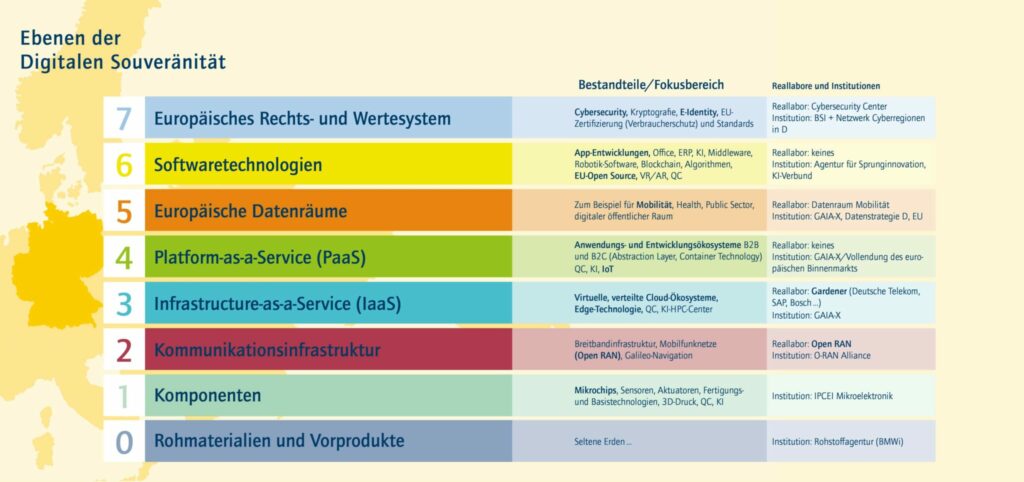
Levels of Digital Sovereignty (Grafik: acatech)
Plattform Lernende Systeme
At the Digital Summit 2020, the PLS highlighted the importance of AI in building a more sustainable, eco-friendly future. In keeping with the summit’s theme of “More Sustainability by Means of Digitalisation”, the PLS presented an action map of concrete AI use cases. The map features applications such as AI-controlled wind farms that generate more electricity by adjusting to changing weather and load conditions, remote-controlled robots that reduce pesticide usage in agriculture, and bakeries that use intelligent software to update their sales planning on a daily basis. These examples demonstrate that AI is an invaluable tool not only for using data to add value but also for doing business more sustainably.
In its Progress Report 2020, the Plattform Lernende Systeme summarises the themes that it has focused on to date, together with its key findings. It describes the main priorities of national and international AI research and presents practical use cases drawn from different industries. These demonstrate that AI has already arrived – it is already part of our everyday lives. As such, the work of the PLS focuses on promoting a public dialogue about how we use artificial intelligence and which changes we are prepared to accept to enable its use.
The Plattform Lernende Systeme’s diverse contributions illustrate the full spectrum of opportunities and challenges associated with AI. For example, how learning systems can support healthcare and mobility, how businesses can introduce AI and use it to create new business models, or how AI systems can be deployed in a reliable, trusted and secure manner. I would like to thank the members of the Plattform Lernende Systeme for everything they have achieved to date, and for their hard work and voluntary engagement.
Anja KarliczekFederal Minister of Education and Research
in the Plattform Lernende Systeme Progress Report 2020
Industrie 4.0
More and more German companies have embarked on the Industrie 4.0 journey in recent years. Developed by acatech and published in 2017, the Industrie 4.0 Maturity Index has often provided an invaluable source of guidance. This acatech study, which has even been translated into Russian, helps businesses to map out their own individual path towards Industrie 4.0. A new edition of the Industrie 4.0 Maturity Index was published in early 2020, together with a companion publication featuring successful case studies.
The term “Industrie 4.0” was coined ten years ago in acatech’s Berlin office, and an Industrie 4.0 Working Group was subsequently established, coordinated by the Academy. By the time of the 2013 Hannover Messe, this project had already become a widely supported strategic initiative. acatech now coordinates the Research Council of the Plattform Industrie 4.0.
Henning Kagermann is the driving force behind Industrie 4.0 and currently serves as the Global Representative and Advisor of Plattform Industrie 4.0. In October 2020, the Chairman of the acatech Board of Trustees was awarded the prestigious Honda Prize 2020 in recognition of his efforts to promote international partnerships between Germany, Japan and many other countries around the world.
Projects
- The Research Council of the Plattform Industrie 4.0
- UPLINX – Interuniversitäres Qualifikationsprogramm Machine Learning für die Praxis *
- acatech HORIZONS: Blockchain
- Lernende Systeme – Germany’s platform for artificial intelligence
- SmartAIwork (Zukunft der Betriebsabläufe) *
- Digital service platforms – success factors for the Smart Service Welt
- HR Working Group – Forum for HR Directors on the Future of Work
- Industrie 4.0 – Zukunft der Industriearbeit *
- Innovationskraft in Deutschland verbessern – Ökosystem für Wachstumsfinanzierung stärken *
- Kollaboration als Schlüssel zum erfolgreichen Transfer von Innovationen am Beispiel der Automobillogistik 4.0 (InnoKey 4.0) *
Publications
- acatech HORIZONTE: Quantentechnologie *
- Künstliche Intelligenz zum Nutzen der Gesellschaft gestalten – Potenziale und Herausforderungen für die Erforschung und Anwendung von KI (Fortschrittsbericht) *
- Resiliente Vorreiter aus Wirtschaft und Gesellschaft *
- AI business models for travel and transport
- Certification of AI systems
- Securing the future with AI – Approaches for increased resilience and digital sovereignty
- Introduction of AI systems in companies
- From data to AI
- AI in medicine and care from the perspective of patients
- Ethics Briefing – Guidelines for a responsible development and application of AI systems
- European Public Sphere. Towards Digital Sovereignty for Europe
- Creating Value from Data – Potentials of data- and AI-based value networks
- acatech HORIZONTE: KI in der Industrie *
- Criteria for Human-Machine Interaction with AI
- Certification of AI Systems
- Industrie 4.0 Maturity Index. Managing the Digital Transformation of Companies – UPDATE 2020
- Using the Industrie 4.0 Maturity Index in Industry. Current challenges, case studies and trends
- Sichere KI-Systeme für die Medizin – Datenmanagement und IT-Sicherheit in der Krebsbehandlung der Zukunft *
- Additive Fertigung – Entwicklungen, Möglichkeiten und Herausforderungen *
- Lebenslanges Lernen fördern – gute Beispiele aus der Praxis. Ein Good-Practice-Bericht des Human-Resources-Kreises von acatech. Lessons Learned, wissenschaftliche Analysen und Handlungsoptionen. *
- Data Science: Lern- und Ausbildungsinhalte *
- Akzeptanz von Industrie 4.0. Abschlussbericht zu einer explorativen empirischen Studie über die deutsche Industrie *
- New Business Models Using Artificial Intelligence
News items
- Neue acatech HORIZONTE Quantentechnologien erklärt die „Quantessenz“ *
- KI gestalten – Plattform Lernende Systeme legt Fortschrittsbericht vor *
- Resilient durch Digitalisierung: acatech zeigt Beispiele aus Wirtschaft und Gesellschaft *
- KI für eine nachhaltige Gesellschaft: Landkarte zeigt Anwendungen *
- Nachhaltige Mobilität mit KI: Wie zukunftsfähige Geschäftsmodelle für Reisen und Transport entstehen *
- KI in der Sachbearbeitung: acatech stellt Projektergebnisse vor *
- Zertifizierung von KI: Plattform Lernende Systeme benennt Prüfkriterien *
- Zukunftsfähig mit KI: Plattform Lernende Systeme bezieht Position *
- Gutes Change-Management: Wie KI in Unternehmen erfolgreich wird *
- Kompetenzen und souveräne Infrastruktur: Wie mit Data Science erfolgreiche KI entsteht *
- Something with AI and data: Plattform Lernende Systeme gives overview of study programmes
- Sovereignty and cooperation: Towards a strong European AI ecosystem
- KI: Deutsche und niederländische Experten diskutieren über besseren Wissenstransfer *
- AI in medicine and care: patients see more opportunities than risks
- Develop and apply AI responsibly: Plattform Lernende Systeme publishes guide
- Henning Kagermann awarded Honda Prize for the strategic initiative Industrie 4.0
- AI for SMEs: Plattform Lernende Systeme delivers guidelines
- Chancen und Herausforderungen der KI *
- AI in Germany: Extended map provides overview of research, applications and transfer
- Communicating knowledge to AI – Web-Talk about practical experiences
- Digital sovereignty: High-caliber project group presents concept for a European Public Sphere
- Web-Talks on the transformation of the economy
- Best practice for companies: How to turn data into successful business models
- Criteria for AI in the company: How the cooperation with employees is successful
- What is, can and may Artificial Intelligence? – Advanced training for teachers on Digital Day 2020
- Vernetzte Datenquellen für bessere Gesundheitsversorgung: GAIA-X-Bericht benennt Anforderungen *
- Strengthening the resilience of our economy and society: Plattform Lernende Systeme emphasises contribution of AI and digitisation
- Schlüsseltechnologien Machine Learning und Data Science: Mehr Bildungsangebote nötig *
- Machine Learning in der Medizintechnik: Publikation zeigt Vorteile und Risiken *
- Certification of AI Systems: Plattform Lernende Systeme names Challenges
- New edition of Industrie 4.0 Maturity Index provides guidance for businesses
- Zukunft aus dem 3D-Drucker? Wissenschaftsakademien empfehlen Strategien für den Umgang mit Additiver Fertigung *
- Künstliche Intelligenz: So gelingt der Einstieg für den Mittelstand *
- acatech Initiative „Advanced Systems Engineering“ (ASE) berät über erfolgreiche Innovationen made in Germany *
- Interdisziplinärer Austausch: AG-Leitungen der Plattform Lernende Systeme erarbeiten Schwerpunktthemen 2020 *
- Filmgespräch bei acatech am Dienstag: Wie sieht das Zusammenleben mit Robotern aus? *
- Rückschau: Das Wissenschaftsjahr 2019 – Künstliche Intelligenz *
- Berufsbild Data Scientist: Welche Kompetenzen gefragt sind *
- Nachhaltigkeit in der Lebensmittelherstellung – Ein Gastbeitrag von Stephan Becker-Sonnenschein *
- Was soll Pflegerobotik leisten und wo braucht es den Menschen? *
- Bundesweite Aktionstage Netzpolitik und Demokratie: acatech richtet Cyber Security-Fortbildung für Lehrkräfte aus *
- Wie lernende Systeme die Produktion effizienter machen *
- Diskriminierung durch Algorithmen – Die Ursache ist immer der Mensch *
- Digital-Gipfel: Digitale Souveränität in Zeiten von KI und Plattformökonomie *
- Akzeptanz von Industrie 4.0: Forschungsbeirat legt Abschlussbericht vor *
- Digital-Gipfel 2019: Plattform Lernende Systeme präsentiert Umfeldszenario zur Mobilität der Zukunft *
- Zukunftsfähig mit KI: Plattform Lernende Systeme veröffentlicht Leitfaden für Unternehmen *
- Digital-Gipfel 2019: Beiträge der Plattform Lernende Systeme und von acatech Präsident Karl-Heinz Streibich *
- Bürgerdiskussion über Künstliche Intelligenz und Robotik in der Medizin *
- Studie: Smart Maintenance in der produzierenden Industrie noch nicht angekommen *
- Was braucht der Mittelstand? Plattform Lernende Systeme bei KI-Mittelstandstagung im BMWi *
- acatech am Dienstag: Kann die Blockchain-Technologie demokratische Prozesse verbessern? *
- Industrie 4.0: Forschungsbeirat nennt die wichtigsten Themenfelder der nächsten Jahre *
- acatech publishes English version of its STUDY on “Strengthening the growth finance ecosystem”
- acatech und die Bayerische Stiftung Amerikahaus veranstalten Blockchain-Herbst *
- Cybersicherheit und Gesellschaft: Wieviel Souveränität brauchen Deutschland und Europa? *
- acatech Vorstandsmitglied Martina Schraudner zu Gast bei Afterwork-Reihe „Digital Women“ von IHK und Digital Media Women *
- Nicht die Nutzer, sondern die Branche muss für die Onlinesicherheit sorgen – Ein Gastbeitrag von Stephan Micklitz *
- Digitalisierung braucht Cybersicherheitsforschung – Ein Gastbeitrag von Michael Waidner *
- Cyber Security für jeden: neue HORIZONTE-Publikation ist da *
- Cyber Security für Jeden – Studierende der Hochschule München erarbeiten Konzepte zur Aufklärung vor Gefahren im Internet *
- Cyber-Attacken: Was wir aus den Angriffen in der Vergangenheit lernen können *
- acatech HORIZONTE gehen in die vierte Runde und widmen sich dem Thema Künstliche Intelligenz in der Industrie *
- Workshop in Berlin: Wie Akzeptanz in der Industriearbeit 4.0 geschaffen werden kann *
- KI – Made in Germany: Jahreskonferenz der Plattform Lernende Systeme *
- acatech Studie zeigt, wie Finanzierungslücke für Wachstumsunternehmen geschlossen werden kann *
- Cyber Security: Der Staat im Spagat zwischen Schutz und Ethik – acatech am Mittag im Deutschen Bundestag *
- Einsatzkräfte schützen: Plattform zeigt Potenziale von KI in gefährlichen Umgebungen *
- Denn ohne Sicherheit ist keine Freiheit – Ein Gastbeitrag von Thomas Tschersich *
- InstandhaltungsForum 2019: acatech stellt erste Projektergebnisse zum Thema Smart Maintenance vor *
- Ratschläge zum Schutz persönlicher Daten von IT-Experte Alexander von Gernler *
- acatech im Bayerischen Landtag: Cyber Security – Wie wird der bayerische Mittelstand sicherer? *
- KI-Forschung in Deutschland: Landkarte der Plattform Lernende Systeme gibt Überblick *
- KI zum Ausprobieren: MS Wissenschaft tourt mit schwimmender Ausstellung durch Deutschland *
* content only available in German

Energy and Resources
While the energy transition and climate change were the big issues in 2019, in 2020 they were often overshadowed by news items about the global pandemic. COVID-19 also forced the postponement of the UN Climate Change Conference, which was due to clarify a number of important issues in the Paris Climate Agreement. But climate change has not stopped because of recent events, and many of the national and international pathways needed to achieve the energy transition have still not been embarked on. acatech and the Academies’ Project “Energy Systems of the Future” (ESYS) are working to show how we can achieve stable, renewable and sustainable energy systems.
The findings of the “(De)centralised energy supply” working group highlighted the importance of ambitious pathways for expanding both wind and solar power and the electricity grid. The Academies’ Project “Energy Systems of the Future” (ESYS) advocates a smart mix of centralised and decentralised technologies. This will be key to creating a climate-friendly, secure and competitive energy supply by 2050. It will require us to harness every available opportunity for expanding wind and solar power generation.
The energy transition cannot succeed unless the grid is expanded. However, if grid expansion suffers further delays, a combination of decentralised solar systems, storage units and power-to-gas technology could still help to achieve the short-term climate targets.
Jutta HansonTechnical University of Darmstadt

Centralised and decentralised solar PV
The mix of centralised and decentralised generation determines which actors are involved in the energy supply and what role they play. Large solar farms are one example of a centralised generation solution that is particularly suited to sparsely populated areas such as former lignite mining regions. Since most of it will not be consumed locally, the electricity is fed into a High Voltage or Extra High Voltage grid, potentially requiring further grid expansion.
© acatech/Leopoldina/Akademienunion (Eds.): Centralized and decentralized components in the energy system. The right mix for ensuring a stable and sustainable supply
A vision for the energy transition
There is widespread public support for the energy transition’s goals. But when it comes to their concrete implementation, projects such as wind farms often encounter public opposition if they affect people’s private lives. Is it still OK for us to fly to our holiday destination, eat meat or drive to work? In the EnVision project, acatech and HUMBOLDT-VIADRINA highlighted the tensions and value conflicts that arise in connection with the energy transition.
Following discussions in different formats with experts from science, industry, government, the public administration and civil society organisations throughout Germany, a series of recommendations were formulated for revitalising the stalled energy transition and establishing a closer link between the energy transition and climate action debates. It was found that positive visions can give the energy transition fresh momentum and encourage bold action. In a series of videos, various experts involved in the project share their personal responses to some of the questions that it raises. Why do we need visions for the energy transition? What might an appropriate vision look like? And how is the current pandemic affecting the energy transition?
I believe that, now more than ever, we need to implement the energy transition to prevent other major crises from occurring in the future.
Manfred FischedickWuppertal Institute
In the light of the pandemic and the overshadowing of climate issues during the first six months of the year, acatech, Leopoldina and the Union of Academies published the ad hoc statement “Energy transition 2030. Europe’s path to climate neutrality”to coincide with Germany’s Presidency of the Council of the European Union. The academies identified the expansion of the electricity grid and of wind power, solar PV, electric mobility and heat pump technology as indispensable “no regret” measures for the energy transition. According to the experts, investment in hydrogen and the corresponding pilot systems will also be vital to the future energy supply.
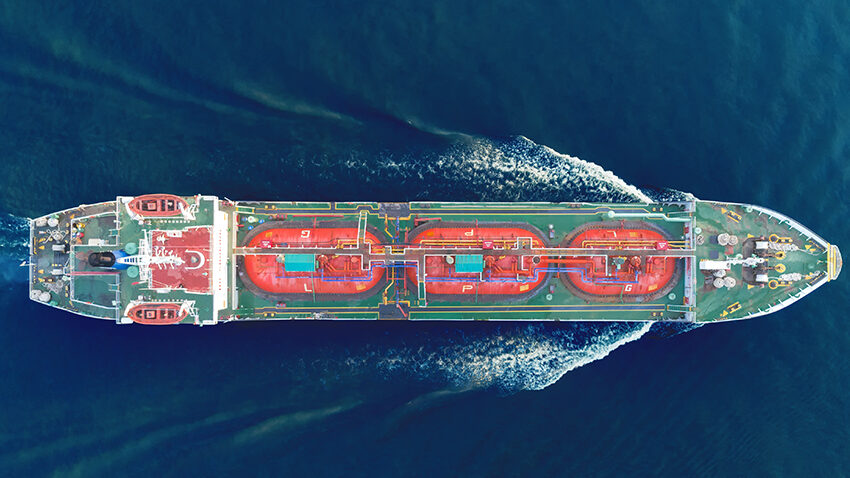
Hydrogen – the first element in the energy transition
Hydrogen came to the fore on the domestic policy front when the German government published its National Hydrogen Strategy in summer 2020. The strategy establishes a framework for action and sets targets for the energy transition’s latest big hope. However, a lot of unanswered questions remain about a hydrogen economy in Germany, not least where the electricity required to produce the necessary quantities of hydrogen will come from. HySupply is a bilateral project between acatech and the Federation of German Industries (BDI) and partners in Australia. The partners are investigating the feasibility of a complete value chain for renewable hydrogen between the two industrialised nations involved in the project.
Materials Research: Inspired by Nature
Materials play a key role in almost every technology field and almost every product. In December 2019, acatech published the DISCUSSION paper Materials Research: Inspired by Nature – Innovation Potential of Biologically Inspired Materials. The publication is one of the outputs of the BMBF-funded project of the same name. It describes the huge range and diverse areas of application of bio-inspired materials, in which biology meets technology, chemistry, energy, medicine, robotics and even the creative disciplines. Based on the publication’s findings, the BMBF launched the ideas competition “Biologisation of Technology” in May 2020. The competition aims to encourage the use of biological resources, principles and processes in materials research and science.
At an acatech am Mittag (Lunch with acatech) event for parliamentarians in November 2020, German Bundestag deputies and the parliamentary parties’ research spokespersons discussed the innovation potential of bio-inspired materials with the project leader and the BMBF.
Nature produces highly complex structures from just a handful of basic materials. We can learn a lot from this, in terms of intelligent materials, for example. We will store information using intelligent materials that absorb the energy needed for information processing from their environment.
Peter FratzlDirector of the Max Planck Institute of Colloids and Interfaces in Potsdam
Projects
- Holzbasierte Bioökonomie – Treiber innovativer Technologien *
- HySupply – German-Australian Feasibility Study of Hydrogen produced from Renewables
- Energiewende 2030 *
- Wege in eine nachhaltige Stickstoffwirtschaft *
- EnVision – Eine Vision für die Energiewende gestalten *
- Sichere Entsorgung und Tiefenlagerung von hochradioaktivem Material *
- Materialforschung: Impulsgeber Natur. Innovationspotenzial biologisch inspirierter Materialien und Werkstoffe *
- Energy Systems of the Future (ESYS)
- Biodiversität in der Agrarlandschaft *
- Pathways into the energy future. The transformation of energy systems in an international perspective
- Geothermal technologies in metropolitan regions: a contribution to the energy transition and climate protection
- Rahmenbedingungen für die Zukunft der Werkstoffe *
Publications
- EnVision –Visionen für die Energiewende gestalten *
- Biodiversität und Management von Agrarlandschaften. Umfassendes Handeln ist jetzt wichtig *
- Pricing Carbon, Reforming Energy Prices. Pathways to a Cross-sectoral Market Design
- Netzengpässe als Herausforderung für das Stromversorgungssystem. Regelungsfelder, Status quo und Handlungsoptionen *
- Grid Congestion as a Challenge for the Electricity System. Options for a future Markt Design
- Energy transition 2030: Europe’s path to carbon neutrality
- Pathways into the energy future. The transformation of energy systems in an international perspective
- Additive Fertigung – Entwicklungen, Möglichkeiten und Herausforderungen *
- Centralised and decentralised components in the energy system. The right mix for ensuring a stable and sustainable supply
- (De-) Zentralität in technischen Szenarien *
- Materials Research: Inspired by Nature. Innovation Potential of Biologically Inspired Materials
News items
- Mobilität im Corona-Jahr – und ein Ausblick auf die diverse Mobilität von morgen *
- Grüner Neustart der Wirtschaft nach Corona? *
- acatech and BDI launch German-Australian hydrogen project “HySupply”
- KI für eine nachhaltige Gesellschaft: Landkarte zeigt Anwendungen *
- Bundestagsabgeordnete diskutieren Biologisierung der Materialforschung *
- Academies urge immediate action to protect biodiversity
- ESYS stellt Impulse für ein neues Marktdesign vor *
- Ein neues Marktdesign für die Energiewende: Netzengpässe bewältigen, Sektorenkopplung fördern *
- Safeguarding our food supply against Covid-19 and climate change
- Planet Erde – unser Lebens- und Gestaltungsraum *
- EnVision Halbzeitbilanz: Visionen als Antrieb für die Energiewende *
- Sauber und kreativ – wie Energieforschung und Glaskunst zusammen kommen *
- Elektroschrott reduzieren, effektiv recyclen und Geschäftsmodelle neu denken *
- Energy transition 2030: Academies describe path to climate neutrality in Europe
- Ideenwettbewerb: Biologisierung der Technik *
- Energieforschung international: Bericht zeigt, wie andere Länder in die Energiezukunft aufbrechen *
- Na denn Prost! – Wie sicher ist unser Trinkwasser? *
- CO2 – Klimakiller oder nützlicher Rohstoff? *
- Eine Vision für die Energiewende gestalten *
- Zentral oder dezentral? Wissenschaftsakademien zeigen Wege zu einer nachhaltigen Energieversorgung *
* content only available in German
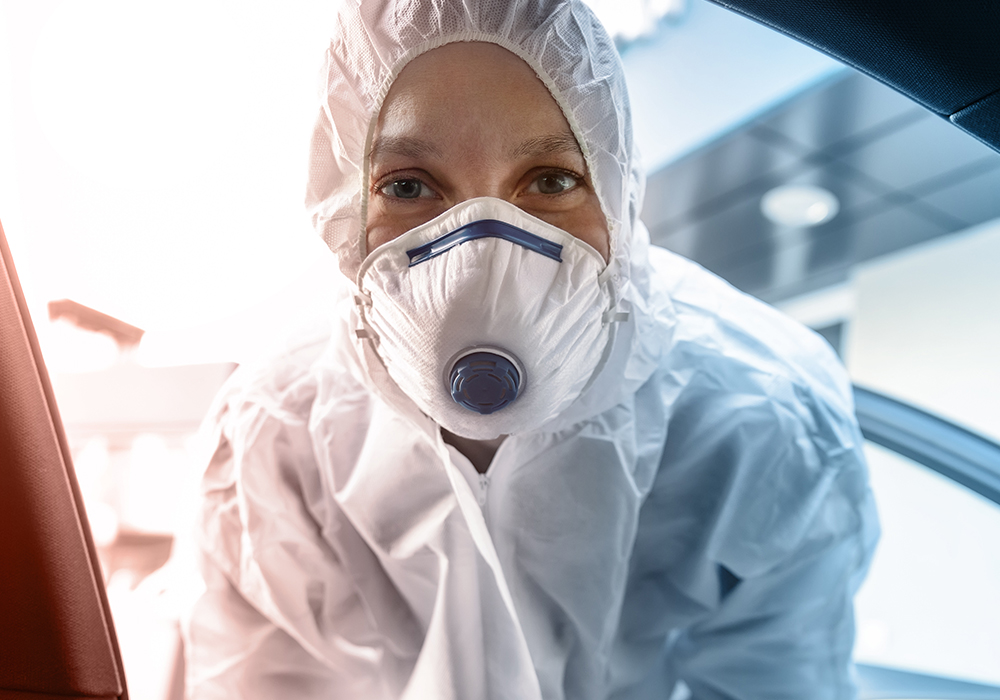
© Shutterstock/Gorlov-KV
Healthcare technologies
Initial lessons from the coronavirus pandemic
The measures taken in 2020 to protect public health during the coronavirus crisis called for a huge effort from the whole of society, with strict lockdowns being imposed to prevent the healthcare system from being overwhelmed. In a paper commissioned by the Federal Ministry of Health and produced between July 2020 and February 2021, an acatech task force analysed the initial lessons that can be learnt from the coronavirus crisis with a view to making the healthcare system more resilient and improving its performance..
Increased digitalisation of the healthcare sector is one of the keys to strengthening its resilience. According to acatech President Karl-Heinz Streibich, “We must systematically harness the opportunities offered by digitalisation in the healthcare sector, too. This will require the establishment of a Health Data Space that enables the exchange of information in real time and its in-depth analysis and evaluation using artificial intelligence”. The establishment and expansion of an innovation ecosystem and the accumulation of appropriate reserves can also help to strengthen resilience.
Europe must ask itself how it can get better at developing new technologies. And it´s not just about vaccines.
The fact is, we need a European innovation ecosystem.
Stefan Oschmanacatech Vice-President and CEO of Merck
Using AI and machine learning to support the medical profession
How to reduce the burden on medical professionals in their everyday work was already an important question even before the coronavirus crisis. The use of learning systems in medicine and medical technology will offer a key solution to this and other challenges in years to come. The Plattform Lernende Systeme publication AI in medicine and care discusses this topic from the perspective of patients. In another publication, the Plattform’s experts explore the specific question of data management and IT security in the future of cancer treatment.
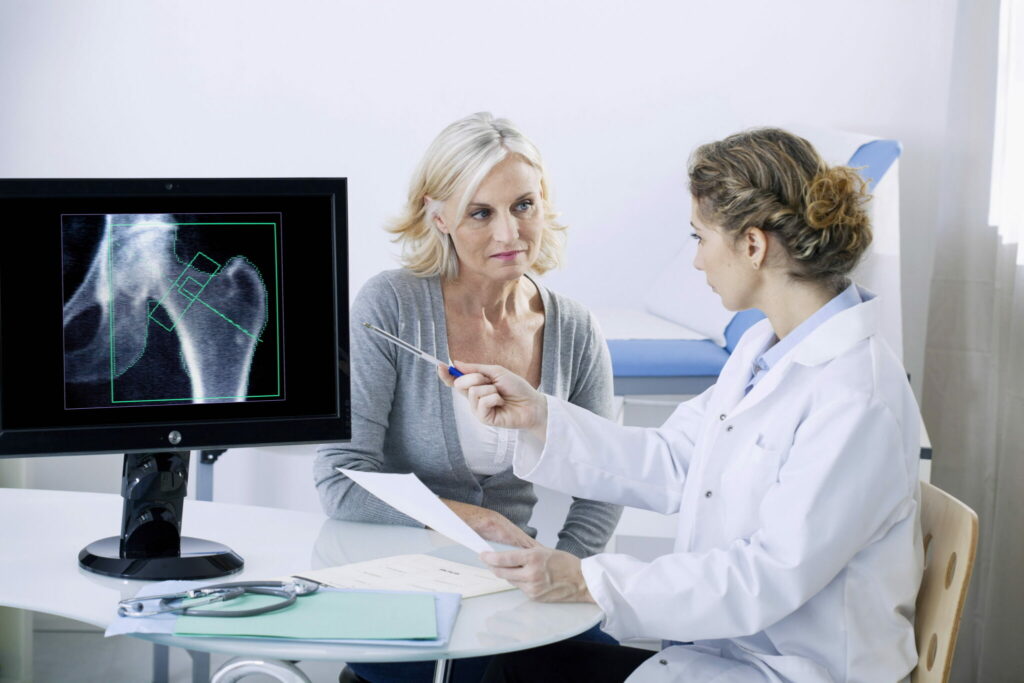
While learning systems undoubtedly offer benefits for healthcare and medical professionals, they also entail certain risks. Published in May 2020, the acatech POSITION PAPER on Machine Learning in Medical Technology presents an overview of current and future applications and examines the technology’s pros and cons. The latter include questions relating to data protection, potential changes in the doctor-patient relationship, and the establishment and use of large medical databases.
Technological and medical developments in the healthcare sector are always entwined in a web of laws and regulations that are also worthy of attention. In an acatech IMPULSE published in July 2020, experts discuss the European Union’s new Medical Device Regulation, which has a number of significant implications for patients, research and development and the medical technology industry.
Projects
Publications
News items
- „Technologischen Wandel gestalten“: Projektmitglieder nehmen Arbeit auf *
- Expertengruppe von acatech warnt vor Engpässen in der Medizinversorgung durch neue EU-Regulierung *
- Machine Learning in der Medizintechnik: Publikation zeigt Vorteile und Risiken *
- Patientendaten schützen, Diagnosen verbessern: Sichere KI in der Medizin *
- „Wir müssen in einen Zustand wachsamer Normalität kommen“: Interview mit Christoph M. Schmidt *
- Neue Möglichkeiten und ethische Grenzen der Gen-Schere CRISPR-Cas *
- KI zum Ausprobieren: MS Wissenschaft tourt mit schwimmender Ausstellung durch Deutschland *
* content only available in German
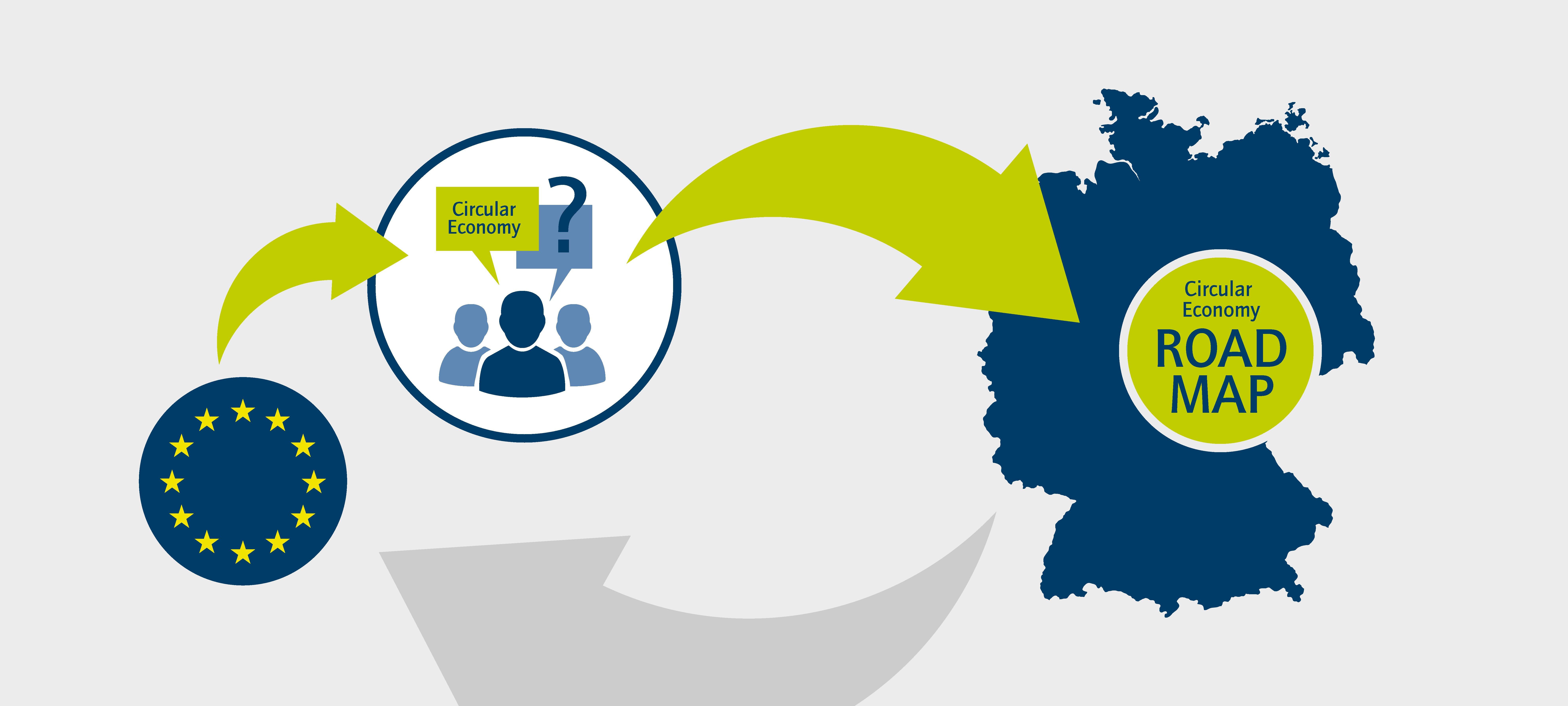
© acatech
Circular Economy Initiative Deutschland
In the Circular Economy Initiative Deutschland (CEID), some 130 experts from over 50 institutions explore how to achieve a systemic structural transition from a linear, resource-intensive model of value creation to a circular, resource-efficient model. The work of the Circular Economy Initiative Deutschland is divided between its three working groups. While the first working group explores the potential of circular business models and digital technology as innovation drivers from a general perspective, the other two focus on the specific functional systems of traction batteries and packaging. The working groups’ findings will form the basis of a Circular Economy Roadmap for Germany. The roadmap will propose an overarching vision of a Circular Economy in Germany, model potential pathways for implementing it, and make a series of general recommendations for government, science and industry.
In 2020, CEID provided expert input at several events, including the DIN Innovation Conference 2020. The conference theme of “Market Acceptance Through Knowledge and Technology Transfer” provided around 500 participants with an opportunity to discuss conceptual and technological approaches to enabling the transition from a linear production and consumption model to a circular economy. The conference was organised by the German Institute for Standardisation (DIN) in cooperation with acatech and the Circular Economy Initiative Deutschland (CEID).
CEID also took part in two EU Presidency events organised by the Federal Ministry of Education and Research. It hosted a workshop on (electric mobility) traction batteries at the European Forum on Science & Education for Sustainability 2020 (EFSES), and facilitated a panel discussion on circular business models at the beyondwork2020 European Conference on Labour Research.
On 15 December, CEID presented its initial findings at an online event during the World Circular Economy Forum.
The findings of the Traction Batteries working group had already been published in October in a report entitled Resource-Efficient Battery Life Cycles. Driving Electric Mobility with the Circular Economy. The working group, which comprises 21 member organisations from science, industry and civil society, has developed a common vision of what a circular economy for traction batteries could look like in 2030. The vision describes an attractive growth industry for “battery life cycle management”, with huge value-added potential and a key role in the electric mobility sector.
At the beyondwork2020 European Conference on Labour Research in October, the Circular Business Models working group presented an Executive Summary of its final report Circular Business Models: Overcoming Barriers, Unleashing Potentials. Due to be published in 2021, the full report will provide an evidence-based guide for successful business practices in a circular economy. The topics addressed include actor-specific circular business models and their interactions in business ecosystems, current barriers, digital and regulatory enablers, and – based on the above – specific recommendations for how government, science and industry can accelerate the system transition to a circular economy.
We need a circular economy if we are to meet our climate and sustainability targets, both in Germany and throughout the EU, especially in the context of the European Green Deal.
Thomas Weberacatech Vice-President and Co-Chair of the Circular Economy Initiative Deutschland
Projects
Publications
News items
- Circular Economy Initiative Deutschland präsentiert Ergebnisse und Ausblick auf dem World Circular Economy Forum *
- Innovationen für die Circular Economy *
- Mit Circular Economy die E-Mobilität antreiben: Experten wollen Batteriekreisläufe schließen *
- Raus aus der linearen Konsumlogik: Deutschland hat eine Circular Economy Initiative *
* content only available in German
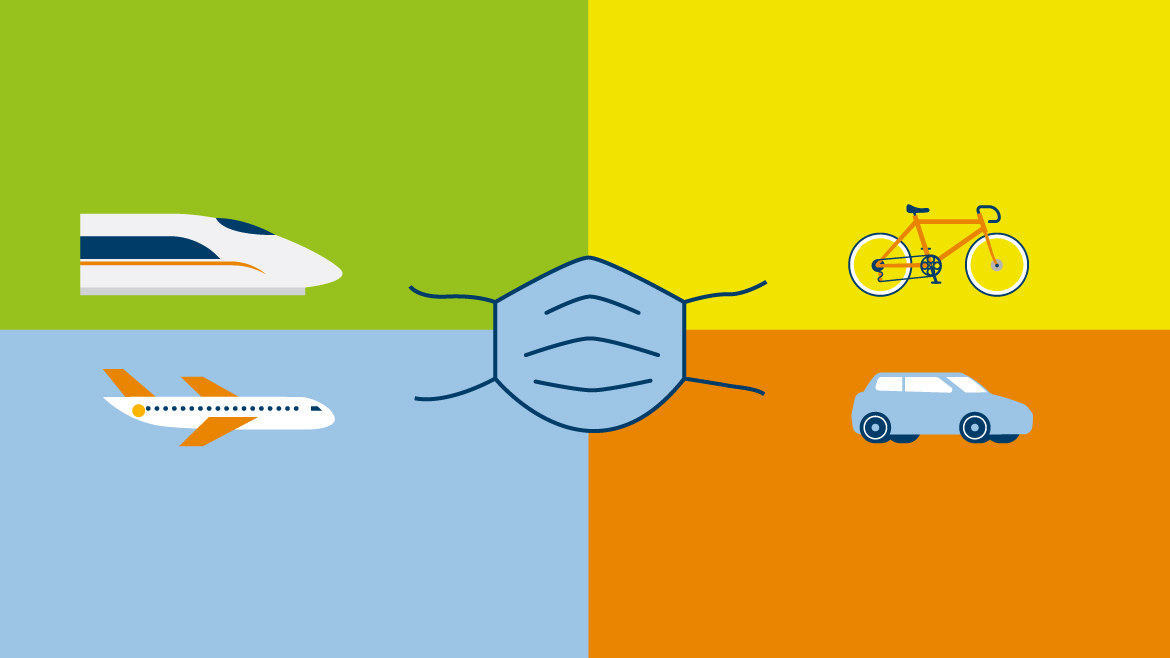
© acatech
Mobility
acatech’s network for the priority theme of mobility comprises experts from the fields of engineering and transport, urban planning, economics and the social sciences. Their work focuses on the fundamental changes in the mobility system that are being driven by measures to protect the climate, electrification, automation and connectivity. The network’s members take a holistic approach to mobility, helping to shape the future of transport in an innovative and technology-neutral manner. Their aim is to enable intelligent, sustainable and user-friendly mobility that addresses all the relevant environmental, social and economic concerns.
National Platform Future of Mobility (NPM)
The past year was a challenging one for the National Platform Future of Mobility (NPM), in many different respects. New topics and activities made it apparent that the overlaps between the working groups are getting bigger, resulting in a growing workload. However, the strategic emphasis of the NPM’s focus areas once again proved its worth in 2020. It remains vital to adopt a holistic, systemic approach to the future of mobility that takes all the relevant interests into account.
The German government continues to rely on the NPM’s expertise. The importance of the NPM’s work was highlighted when the government commissioned a number of additional investigations at short notice in response to the serious impact of the COVID-19 pandemic on the mobility industry. The NPM produced three such reports, on the classification of plug-in hybrid vehicles, the electrification of heavy goods vehicles and the market ramp-up of alternative fuels.
Through its Chairs, the NPM is also involved in providing advice to the Federal Chancellor and coalition leaders via the “Concerted Action for Mobility” (KAM) initiative. During 2020, the National Platform Future of Mobility’s 250 experts produced a total of 20 new reports across the organisation’s six working groups. The NPM Progress Report 2020 “Shaping Transformation with Innovations” provides a summary of the issues addressed, with a focus on innovation.
Innovation is of the utmost importance for the future of mobility and for the future of Germany. With its drastic consequences for the economy and society as a whole, the COVID-19 pandemic has brought this message home to us once more. Innovation will drive the economic recovery and the creation of more resilient systems. It is key to making the mobility system and other sectors sustainable, needs-oriented and competitive.
Henning KagermannChair of the National Platform Future of Mobility and Chair of the acatech Board of Trustees
Mobility data space
Since spring 2020, acatech has led the project to establish a mobility data space, which was initiated by the German government and the members of “Concerted Action for Mobility” and is funded by the Federal Ministry of Transport and Digital Infrastructure.
The project aims to establish a trusted, decentralised data space that enables secure mobility data sharing among all the relevant European and non-European mobility stakeholders with a view to promoting digital business models and innovative services in the mobility sector.
The project began with a stakeholder dialogue between actors from the automotive industry, mobility services sector, transport companies, the research community, government and various other areas. The discussions focused on the organisational, technical, legal and financial requirements for a mobility data space. The project group built on existing concepts and initiatives to progress work on the technical infrastructure, and developed a number of use cases. At the same time, an organisational structure was developed to facilitate the mobility data space’s operation and strategic development. Thus, within the space of a year, the project participants were able to lay the foundations for the establishment of a mobility data space in 2021.
Mobility Monitor 2020
How is the coronavirus crisis affecting the mobility behaviour of people in Germany? Has there been any change in public attitudes towards electric mobility? And do people still regard climate and environmental protection as important issues?These are some of the questions answered against the backdrop of the COVID-19 pandemic by Mobility Monitor 2020, a survey undertaken on behalf of acatech by the Allensbach Institute for Public Opinion Research (IfD). Carried out in summer 2020, the second edition of this representative population survey reveals that the German public is expecting major changes in the mobility system. While Mobility Monitor 2020 still looks at the trends in attitudes towards environmental and climate protection, its main focus was to investigate whether there have been any changes in people’s mobility behaviour since the onset of the coronavirus crisis. In a year overshadowed by the pandemic, cycling was the mode of transport that experienced the largest growth.
Projects
Publications
- Roadmap zur Implementierung der ISO 15118 – Standardisierte Kommunikation zwischen Fahrzeug und Ladepunkt *
- Gesellschaftliche Dialog- und Beteiligungsstrategie zur Gestaltung digitalisierter Mobilität *
- Maßnahmen zur Digitalisierung der Verkehrsinfrastruktur *
- Werkstattbericht Antriebswechsel Nutzfahrzeuge – Wege zur Dekarbonisierung schwerer Lkw mit Fokus der Elektrifizierung *
- Werkstattbericht Alternative Kraftstoffe – Klimawirkungen und Wege zum Einsatz alternativer Kraftstoffe *
- Schwerpunkt-Roadmap Nachhaltige Mobilität – Standards und Normen *
- Flächendeckende öffentliche Ladeinfrastruktur *
- Factsheet „Vehicle to Grid“ – Kundennutzen und Netzintegration *
- Positionspapier „Elektrische Maschine – Status Quo, Ausblick und Handlungsbedarfe für die deutsche Wirtschaft“ *
- Positionspapier „Qualitative Betrachtung des Wertschöpfungsnetzwerks Batterierecycling“ *
- Empfehlungen zum optimierten Nutzungsgrad von Plug-in-Hybridfahrzeugen *
- Plattformbasierte intermodale Mobilität und Handlungsempfehlungen zu Daten und Sicherheit *
- Netzintegration von Elektromobilität – Basis für eine erfolgreiche Sektorkopplung. Eine Definition *
- Einsatzmöglichkeiten unter realen Rahmenbedingungen *
- Handlungsempfehlungen zur Typgenehmigung und Zertifizierung für eine vernetzte und automatisierte Mobilität *
- Schwerpunkt-Roadmap Automatisiertes und vernetztes Fahren *
- Kundenfreundliches Laden – Fokus Öffentliche Ladeinfrastruktur *
- Schwerpunkt-Roadmap Intelligentes Lastmanagement *
- Handlungsempfehlungen zur Typgehmigung und Zertifizierung für eine vernetzte und automatisierte Mobilität *
- Bedarfsgerechte und wirtschaftliche öffentliche Ladeinfrastruktur – Plädoyer für ein Dynamisches NPM-Modell *
- Schwerpunkt-Roadmap Automatisiertes und vernetztes Fahren *
- 1. Zwischenbericht zur strategischen Personalplanung und -Entwicklung im Mobilitätssektor *
News items
- Weichenstellung 2020 – Schiene zwischen Digitalisierung und Strukturwandel *
- Mobilität im Corona-Jahr – und ein Ausblick auf die diverse Mobilität von morgen *
- Mobilitätsmonitor 2020: Deutsche wünschen sich klimagerechte und zukunftsweisende Mobilität *
- Startschuss für RealLabHH: Hamburg erprobt die digitale Mobilität von Morgen im Alltag *
- Schülerinnen und Schüler informieren sich über acatech *
- Mobilität der Zukunft gemeinsam gestalten *
- Umsteigen aber wie? – Mobilität in der Stadt von morgen *
- Unterhausdebatte zur Mobilitätswende *
- Verkehr 2030: So kommen wir besser und umweltfreundlicher ans Ziel *
- acatech am Dienstag: Volles Haus bei Diskussion über nachhaltige Mobilität in Landshut *
- Wie wir 2030 unterwegs sind: acatech Studie skizziert Zukunftsbild der vernetzten Mobilität *
- Öffentlicher Dialog in Landshut: Nachhaltige Mobilität in Stadt und Land *
- Gespräch in der Garage: Ein acatech am Dienstag zum Thema Elektromobilität *
- Schülerinnen und Schüler zu Gast bei acatech *
* content only available in German
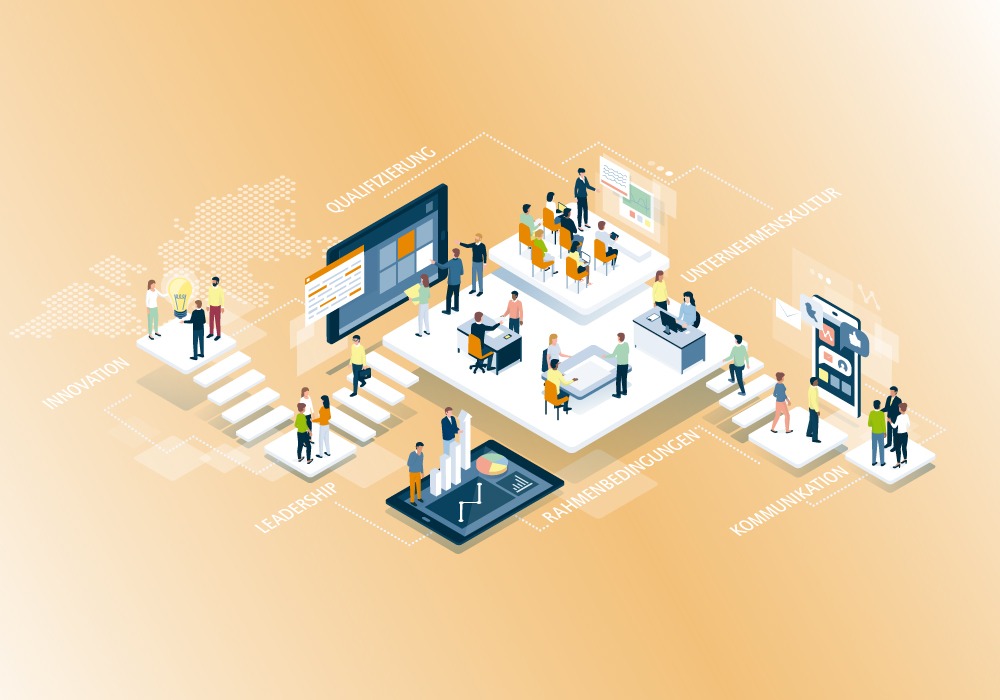
©shutterstock/elenabsl und acatech
Economy, education and work
How can the economy be prevented from coming to a complete standstill when social distancing rules are introduced and businesses are forced to close in order to curb the spread of the coronavirus pandemic? This question was addressed by the Academy’s initial response to the crisis – an acatech IMPULSE published in March 2020. Produced under the direction of the economist Christoph M. Schmidt (RWI, acatech Executive Board), this was the first of a series of acatech publications on the coronavirus pandemic (see also “Resilience in the coronavirus crisis”).
An intensive public debate about when and how the restrictions on public life could be eased began as early as April 2020, in the middle of the first lockdown. Even at this point in time, Christoph M. Schmidt’s interview in the Süddeutsche Zeitung made it clear that there was no prospect of a rapid exit strategy. He warned that Germany’s economy would remain in crisis mode for the rest of the year..
The impacts of the coronavirus crisis were particularly pronounced in the realms of work and education, with working from home and home schooling becoming commonplace. Even during the early stages of the pandemic, acatech contributed to the debate with a series of proposals and recommendations. In an influential interview in spring 2020, acatech President Dieter Spath proposed solutions for reducing contact between employees through physical measures in the workplace and through flexible working hours. He appealed to the managers of businesses and public authorities to support home working:
Home working is a form of work organisation that allows for a high degree of autonomy and individual responsibility – but managers must buy into it. In the past, they haven’t always done so. The positive experiences of the past few weeks could provide a boost for autonomous working and finally lead to people being given more responsibility.
Dieter Spathacatech President (until 16 March 2021)
The experiences with digital education during the coronavirus crisis made it abundantly clear that digital learning and teaching in Germany still have much room for improvement. With this in mind, in May 2020, the Academy drew on the ideas of acatech Members Kristina Reiss (Technical University of Munich), Olaf Köller (IPN Kiel) and Manfred Prenzel (University of Vienna) to produce an interactive graphic that illustrates the concept of a virtual classroom, together with a series of recommendations for making school education fit for the future.
© acatech
Barometer of Young Talents in the STEM subjects
Ensuring the best possible transition to the digital age for Germany’s schoolchildren will involve more than simply increasing the use of digital technology in schools. It will also call for a sustained effort to strengthen STEM education and young talents in the STEM subjects. Published by acatech and the Körber Foundation, the 2020 Barometer of Young Talents in the STEM subjects highlighted the reforms that will be needed in the education system if the quality of STEM education is to be improved. The performance of 15-year-olds in mathematics and science has declined continuously since 2012. Around 20% are failing to attain the basic level required to continue studying these subjects at school or at work. And despite achieving similar grades to boys, girls aged 13-16 still show less interest and self-confidence in mathematics, chemistry and physics. Compared to other countries around the world, the number of young people who start studying a STEM subject at university is higher than average in Germany, and the proportion of women has risen slightly. However the high drop-out rates continue to pose a challenge.
University: teacher training
Number (absolute) of students starting teacher training courses for general education schools in 2018 by subject
German: Mathematics ; Biology; Chemistry; Physics; IT.
Lifelong learning
People don’t stop learning when they leave school, vocational college or university. Especially in the digital age, they will continue to encounter frequent new challenges in their professional lives. Continuing professional development (CPD) is thus key to job satisfaction and participation and to career opportunities. At the beginning of 2020, a report by the academics and Human Resources directors of leading companies who make up acatech’s HR Working Group concluded that many companies are strengthening lifelong learning and changing their culture to enable independent, continuous, work-integrated learning. The HR Working Group publication presents 14 examples of how innovative learning platforms and tools are being used for CPD.
Projects
Publications
News items
- incrisia – spielerisch zu mehr Demokratieverständnis in Krisenzeiten *
- Digitale Lehre in Zeiten von Corona *
- Dialogreihe #DIGITALESHESSEN: Unternehmen – digital, auf Abstand, produktiv *
- „In einer Krise muss man nach innovativen Lösungen suchen“ *
- „Es gibt viele Möglichkeiten der Digitalisierung, die noch stärker auszuschöpfen sind“ *
- Digitale Bildung: Lernen und Lehren im virtuellen Klassenzimmer *
- Schlüsseltechnologien Machine Learning und Data Science: Mehr Bildungsangebote nötig *
- „Es ist wichtig, gemeinsam mit den Beschäftigten Lösungen zu entwickeln“: Interview mit Dieter Spath *
- Zu viele leistungsschwache Schülerinnen und Schüler im MINT-Bereich *
- „Die Wahrnehmung von MINT-Bildung wird sich verändern – zum Positiven“ *
- Wirtschaftsminister Peter Altmaier empfängt acatech Projektteam *
- acatech Initiative „Advanced Systems Engineering“ (ASE) berät über erfolgreiche Innovationen made in Germany *
- Lebenslanges Lernen in Unternehmen: acatech stellt Good-Practice-Beispiele vor *
- Milchkanne versus Melkroboter – Wunsch und Wirklichkeit in der Werbung für Lebensmittel. Oder: Wie geht zeitgemäße Werbung für Lebensmittel? *
- Sustainability Practices in the Cocoa Industry – a Guest Contribution by Lise Birikundavyi
- Schülerinnen und Schüler informieren sich über acatech *
- PISA-Studie: acatech Mitglied und PISA-Beauftragte Kristina Reiss kommentiert die Ergebnisse *
- Arbeit mit Zukunft – Schlüsselfaktoren für die digitale Transformation *
- WGAB-Tagung in München: Wie Weiterbildung an den technologischen Fortschritt angepasst werden kann *
- Workshop-Teilnehmende erarbeiten Zukunfts-Kompetenzbild für Lehrerinnen und Lehrer *
- Schülerinnen und Schüler zu Gast bei acatech *
- MINT Nachwuchsbarometer 2019: Wie MINT-Kompetenzen bei Kindern und Jugendlichen gestärkt werden können *
* content only available in German
Innovation Dialogue
Twice a year, the Federal Chancellor, the Federal Minister of Finance, the Federal Minister for Economic Affairs, the Federal Minister of Education and Research and the Head of the Federal Chancellery meet with representatives of science, industry and civil society to discuss cutting-edge technologies and the innovation policy framework. The 17-member steering committee is headed by Chairman of the acatech Board of Trustees, Henning Kagermann, while several of the Academy’s scientific Members and members of the acatech Senate also contribute expert advice to the Federal Government. The Innovation Dialogues between the Federal Government, Industry and Science are organised by a project office at acatech which also supplies background documentation on the relevant topics, ensuring a common factual basis for the discussions.
In January 2020, the third Innovation Dialogue of the current parliament addressed the innovation potential of second-generation quantum technologies. Technical expertise was provided by steering committee members Reinhard Ploss (CEO Infineon, acatech Executive Board) and Martin Stratmann (President of the Max Planck Society). The Innovation Dialogue participants discussed how well Germany is currently placed to establish a globally competitive quantum technology ecosystem. They assessed the status quo of the following technology fields: enabling technologies, quantum sensors and metrology, quantum communication, and quantum computing and simulation. Germany is strong in enabling technologies and sensors, but has a lot of ground to make up with regard to the commercialisation of quantum computing. As a result of the Innovation Dialogue, the Federal Government announced plans to make an additional two billion euros available for the promotion of quantum technology through the future technologies component of its economic stimulus package, with a focus on quantum computing in Germany. The participants discussed progress with the implementation of these plans during the subsequent Innovation Dialogues.
The theme of the fourth Innovation Dialogue in July was “Innovations for a European Green Deal”. Technical expertise was provided by steering committee members Martin Brudermüller (BASF), Reiner Hoffmann (DGB), Reimund Neugebauer (Fraunhofer Society) and Günther Schuh (RWTH Aachen University). The Innovation Dialogue participants discussed the technological drivers of the transition to environmentally, economically and socially sustainable industrial production in Europe: the digital and biological transformation, electrification and hydrogen, a circular economy, and – in the medium term – CCU/CCS. High levels of public and especially private investment will be required to activate these drivers. Accordingly, the participants also discussed the necessary innovations in the field of sustainable finance, and the structure of European funding instruments such as the European Investment Bank and the European Innovation Council, both during and after Germany’s EU Presidency.
In the second half of 2020, the Innovation Dialogue’s project office produced a dossier on the “resilience of supply chains and value networks”. Drawing on the lessons learnt from the current pandemic and supported by in-depth case studies of the healthcare industries and automotive industry, the fifth Innovation Dialogue discussed how businesses can strengthen the resilience of their supply chains and value networks against all kinds of shocks, and how the policy framework and funding measures can help. Expert input was provided for the dossier by Anna-Katharina Wittenstein (Wittenstein), Andreas Barner (Boehringer Ingelheim), Stefan Vilsmeier (Brainlab) and Oliver Zipse (BMW).
North-Rhine Westphalia Innovation Award
North Rhine-Westphalia’s Ministry of Economic Affairs, Innovation, Digitalisation and Energy recognises outstanding achievements in the field of innovation and research through the North Rhine-Westphalia Innovation Award. Prize money totalling €150,000 makes the Innovation Award the second most valuable award of its kind in Germany, after the German President’s “Deutscher Zukunkftspreis” Award for Innovation in Science and Technology. acatech coordinates the review and jury process.
The 2020 North Rhine-Westphalia Innovation Award ceremony was held on 26 October. The winner of the Innovation category was Matthew Smith of the University of Bonn’s Institute of Computer Science and Fraunhofer FKIE. He won the award for innovations in the field of usable security that use artificial intelligence to make the development of secure software significantly easier. He has also founded a start-up in this field. The winner in the Young Scientists category was Ruhr-Universität Bochum’s Anna Grünebohm for her work on investigating and optimising materials with the aid of computer simulations. The simulations are making a significant contribution to the development of efficient new cooling technologies without coolants that emit greenhouse gases. The winner of the Honorary Award was Michael ten Hompel of the Fraunhofer Institute for Material Flow and Logistics IML, for his pioneering work on the Internet of Things and Industrie 4.0 in the logistics sector. Michael ten Hompel’s vision of a “Social Networked Industry” has had an enduring influence on modern, digital logistics around the world.
Projects
- The Research Council of the Plattform Industrie 4.0
- acatech HORIZONS: Quantum Technologies
- acatech HORIZONTE: Advanced Systems Engineering *
- acatech HORIZONS: Sustainable Agriculture
- acatech HORIZONS: Blockchain
- The Innovation Dialogue between the Federal Government, industry and science
- Innovationskraft in Deutschland verbessern – Ökosystem für Wachstumsfinanzierung stärken *
- Rahmenbedingungen für die Zukunft der Werkstoffe *
Publications
News items
- Dialogreihe #DIGITALESHESSEN: Corona – Turbo oder Bremsklotz für Startups? *
- Green Deal’s goals must not be abandoned due to the current crisis
- Neue acatech HORIZONTE Quantentechnologien erklärt die „Quantessenz“ *
- Henning Kagermann awarded Honda Prize for the strategic initiative Industrie 4.0
- NRW-Innovationspreis 2020 verliehen *
- Innovationspreis NRW startet: Bis 18. September können Forschungsleistungen nominiert werden *
- Vierter Innovationsdialog der 19. Legislaturperiode: Innovationen für einen europäischen Green Deal *
- Innovationspotenziale der Quantentechnologien der zweiten Generation *
- Zukunft aus dem 3D-Drucker? Wissenschaftsakademien empfehlen Strategien für den Umgang mit Additiver Fertigung *
- Dritter Innovationsdialog der 19. Legislaturperiode: Innovationspotenziale der Quantentechnologien der zweiten Generation *
- Nachhaltigkeit in der Lebensmittelherstellung – Ein Gastbeitrag von Stephan Becker-Sonnenschein *
- Die Welt im Wandel: Die Perspektive aus dem All – Ein Gastbeitrag von Hansjörg Dittus *
- New acatech HORIZONS publication on sustainable agriculture launched to coincide with Agricultural Summit
- Bundesweite Aktionstage Netzpolitik und Demokratie: acatech richtet Cyber Security-Fortbildung für Lehrkräfte aus *
- Dynamik der digitalen Transformation macht Vorausschau und Technologieplanung immer wichtiger *
- Innovationspreis NRW startet: Bis 24. November können Forschungsleistungen nominiert werden *
- acatech am Dienstag: Kann die Blockchain-Technologie demokratische Prozesse verbessern? *
- Industrie 4.0: Forschungsbeirat nennt die wichtigsten Themenfelder der nächsten Jahre *
- acatech publishes English version of its STUDY on “Strengthening the growth finance ecosystem”
- acatech POSITION: Werkstoffe sind systemrelevant und brauchen faire Wettbewerbsbedingungen *
- acatech und die Bayerische Stiftung Amerikahaus veranstalten Blockchain-Herbst *
- Cybersicherheit und Gesellschaft: Wieviel Souveränität brauchen Deutschland und Europa? *
- Nicht die Nutzer, sondern die Branche muss für die Onlinesicherheit sorgen – Ein Gastbeitrag von Stephan Micklitz *
- Digitalisierung braucht Cybersicherheitsforschung – Ein Gastbeitrag von Michael Waidner *
- Cyber Security für jeden: neue HORIZONTE-Publikation ist da *
- acatech Studie zeigt, wie Finanzierungslücke für Wachstumsunternehmen geschlossen werden kann *
- Zweiter Innovationsdialog der 19. Legislaturperiode: Impulse für das deutsche Innovationssystem durch den Wettbewerb mit China sowie Plädoyer für Stärkung der Wasserstofftechnologien am Standort Deutschland *
* content only available in German
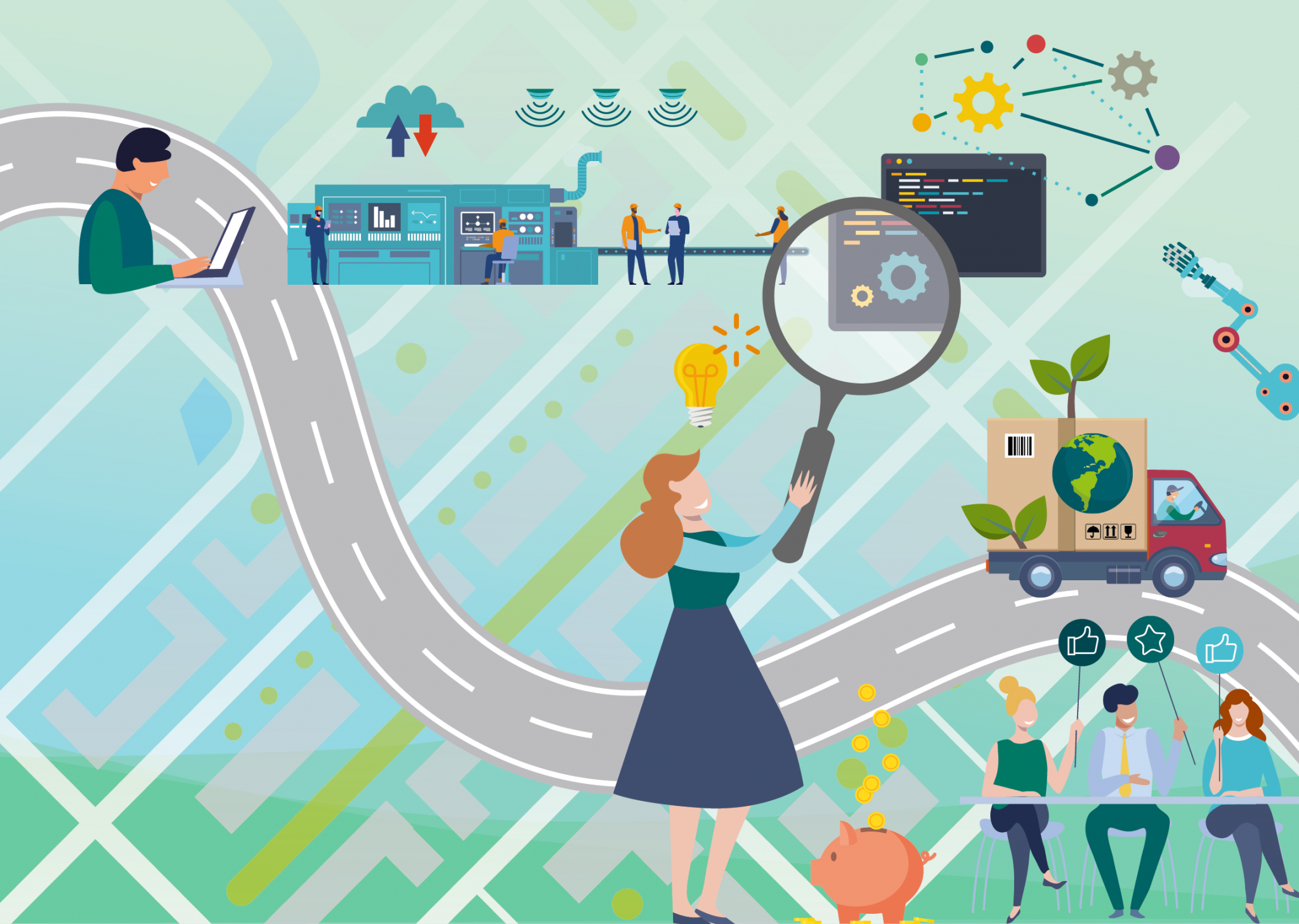
© acatech
acatech HORIZONS
In the acatech HORIZONS series, the Academy explores technology fields that are already looming large on the horizon, but where there is still some uncertainty about their long-term impacts.
In 2020, the series focused on two disruptive technologies: artificial intelligence in industry and quantum technologies. The acatech HORIZONS series aims to describe the available options, explain the opportunities and risks, and stimulate a public debate. It does this through events aimed at specific target groups and through an extensive online presence featuring the recently created HORIZONS logbook. The logbook has played a prominent role during the COVID-19 pandemic, employing a variety of formats and communication methods to promote a dialogue with interested members of the public who are not part of the acatech community.
AI in Industry
The need for widespread public acceptance was identified by the project group’s experts as one of the key challenges confronting the use of artificial intelligence in industry. The importance of teachers as multipliers was addressed by acatech HORIZONS in conjunction with the Plattform Lernende Systeme and the Bayerische Landeszentrale für politische Bildungsarbeit (Bavarian State Centre for Political Education). At the first nationwide continuing education event for teachers, held as part of the Digital Day in July, teachers had the opportunity to speak with experts about the use of AI in medicine and the potential benefits for society. A further continuing education event for teachers was held in November during the Aktionstage Netzpolitik & Demokratie (Digital Rights and Democracy Action Week). This time, the topic was ethics and AI, with a particular focus on the direct implications of AI use for skilled occupations in manufacturing industry.
The relevance of the topics addressed by the HORIZONS series and the information provided is demonstrated not only by the high attendance at HORIZONS events, but also by the fact that AI in Industry has been downloaded over 1,000 times, and by the inclusion of HORIZONS publications on the websites of organisations such as Fraunhofer IPA/Digital Competence Centre Stuttgart and the Daimler AG Intranet.
Quantum Technologies
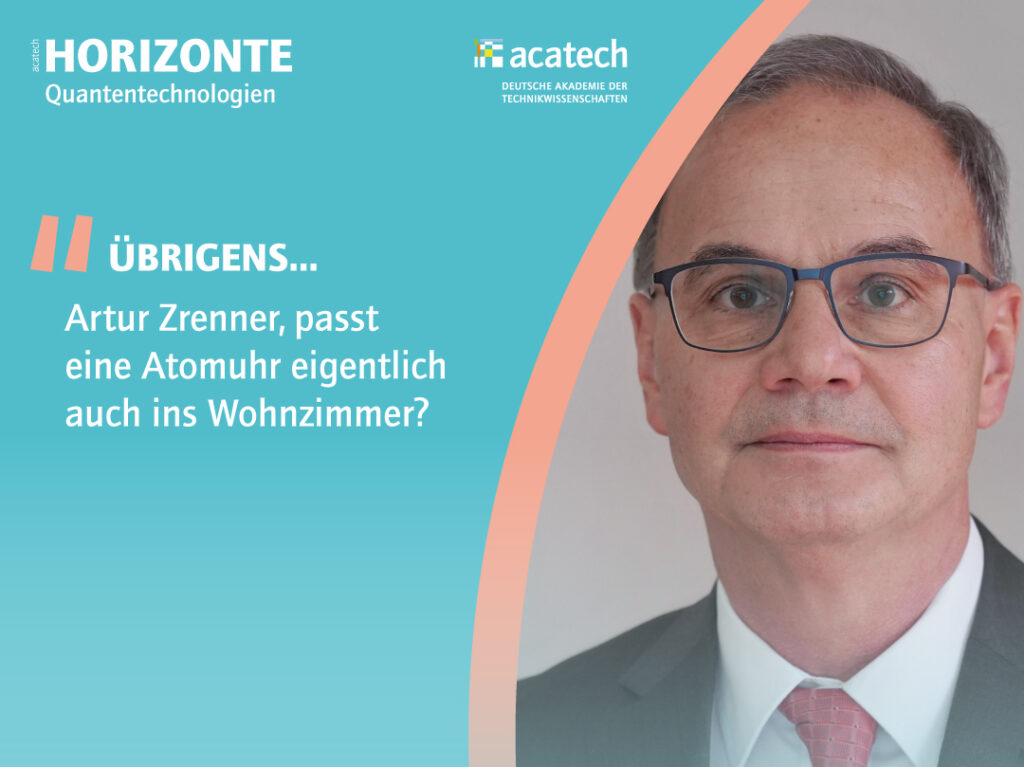
Artur Zrenner, Professor of Physics at Paderborn University, answers a question about whether atomic clocks belong in people’s living rooms
While the details of the quantum technology funding programmes agreed by the Federal Government and individual Länder were being finalised, a prestigious panel discussed concrete proposals for making Germany a world-leading research and business location for this technology at an acatech am Dienstag (acatech on Tuesday) event on 27 October. A similar event for German Bundestag deputies was held in February 2021. The HORIZONS logbook provided accessible explanations of quantum technologies for a broad audience in Quantenphysik für Anfänger (Quantum Physics for Beginners), INNEN-Ansichten einer Physikerin (Being a Woman in Physics: A Personal View) and Atomuhr für das Wohnzimmer (An Atomic Clock in Your Living Room). A collaboration with VHS Wissen live and an information event for members of the Bavarian State Parliament are planned for spring 2021.
Projects
News items
- Neue acatech HORIZONTE Quantentechnologien erklärt die „Quantessenz“ *
- Quantentechnologien – zwischen Forschungsförderung und Wertschöpfung *
- What is, can and may Artificial Intelligence? – Advanced training for teachers on Digital Day 2020
- Na denn Prost! – Wie sicher ist unser Trinkwasser? *
- Milchkanne versus Melkroboter – Wunsch und Wirklichkeit in der Werbung für Lebensmittel. Oder: Wie geht zeitgemäße Werbung für Lebensmittel? *
- acatech diskutiert mit Stakeholdern über Nachhaltige Landwirtschaft *
- Sustainability Practices in the Cocoa Industry – a Guest Contribution by Lise Birikundavyi
* content only available in German
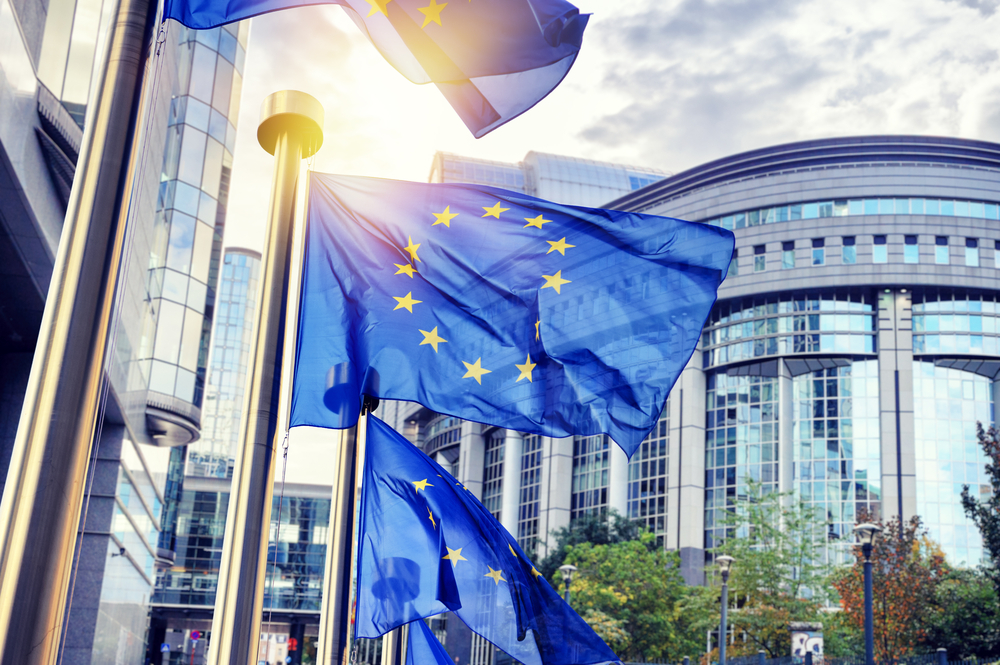
© shutterstock/symbiot
European policy advice
The five European Academy Networks Academia Europaea, ALLEA, EASAC, Euro-CASE and FEAM bring together the expertise of more than a hundred academies in over forty countries across Europe. Through the SAPEA (Science Advice for Policy by European Academies) project, they are part of the European Commission’s Scientific Advice Mechanism (SAM). The SAPEA project is funded through Horizon 2020 and is coordinated by acatech.
The European Commissioners ask the Group of Chief Scientific Advisors questions on scientific issues that are relevant to policy. The academies prepare reports that bring together the available knowledge and formulate evidence-based policy options using an independent, interdisciplinary approach based on state-of-the-art scientific information. The SAPEA Evidence Review Reports provide the scientific basis for the Opinions presented to the European Commissioners by the Group of Chief Scientific Advisors.
In 2020, Evidence Review Reports were published on the topics of “A sustainable food system for the European Union” and “Biodegradability of plastics in the open environment”. Both reports contributed significantly to the European Commission’s strategy formulation process. The academies’ experts also prepared a report entitled “A systemic approach to the energy transition in Europe”. Their findings will be published in 2021 and will inform implementation of the European Commission’s European Green Deal.
SAPEA reports published in 2020 © SAPEA
The SAPEA project also addressed the coronavirus pandemic. The web page “Science fighting coronavirus” provides an overview of the academies’ contributions to tackling the crisis. The “Science for Policy” podcasts series discuss different formats of science-based policy advice and question how science-based policy advice can contribute to tackle the pandemic and where the limits lie for independent policy advice provided by scientists.
The European Council of Academies of Applied Sciences, Technologies and Engineering (Euro-CASE) is one of the partner of the SAPEA project. Euro-CASE also promotes transatlantic cooperation by organising the annual “EU-US Frontiers of Engineering” symposium in conjunction with the United States National Academy of Engineering. The symposium provides young engineers with an opportunity to build collaborative networks for interdisciplinary knowledge and method transfer. This year’s event was postponed until October 2021 due to the coronavirus pandemic.
Sustainable generation and use of energy are one of the most significant challenges of the 21st century. Providing secure supply of clean, competitive, and affordable energy for all raises complex technical, economic, social, and political issues that must be addressed to ensure sustainable growth and development.
Nikola ČavlinaAnnual Conference held in Zagreb in November 2020, and Vladimir Andročec, Croatian Academy of Technical Sciences
Publications

© shutterstock/Markus Pfaff
International Cooperation
International cooperation was once again an integral part of the Academy’s work in 2020. However, acatech’s international activities were somewhat different to previous years due to the coronavirus pandemic – not every project and meeting was able to go ahead as usual. Nevertheless, the Academy was still able to maintain and strengthen its international partnerships thanks to the growing use of digital technology around the world coupled with new meeting solutions.
Through its international activities, the Academy seeks to introduce, reflect and discuss national themes in a European and global context, and address European and global themes in its own work. In 2020, the main focus of acatech’s international cooperation was on the future of work, Industrie 4.0, and innovation, climate and energy policy.
As a member of both organisations, in 2020, acatech continued to engage in the work of the European Council of Academies of Applied Sciences, Technologies and Engineering (Euro-CASE) and the International Council of Academies of Engineering and Technological Sciences (CAETS). The theme of this year’s Euro-CASE Annual Conference, which was held online, was “Dealing with Challenges of the European Energy Transition”.
A hybrid format was adopted for CAETS 2020, which took place in Seoul in October. acatech was involved in planning the event and played an active part in the “Energy” working group. During the two-day CAETS symposium “Engineering a Better World: Smart Society”, 400 leading experts from across the globe discussed and exchanged their views on the themes of Hyper-Connected Life, Sustainable Community, Smart Energy Network and Climate Change. In keeping with the event’s title, they analysed and proposed innovative solutions to the specific challenges that different countries face in building sustainable societies. Produced under acatech’s direction, the CAETS Energy Report 2018 was published in September 2020 following its authorisation by the Energy Committee. The CAETS Energy Report 2020 is currently in preparation and is due to be published in the first half of 2021.
Projects
Publications
News items
* content only available in German

© shutterstock/mapman
Events for parliamentarians
Through its events for parliamentarians, acatech seeks to engage in a regular dialogue with policymakers from central government and the Länder. From March 2020, it was no longer possible to hold face-to-face meetings due to the coronavirus pandemic. However, the dialogue between the Academy’s experts and parliamentarians was maintained through online discussions.
The “acatech am Mittag” (Lunch with acatech) online discussion event in November addressed the innovation potential of biologically inspired materials. The topic was introduced by Ina Schieferdecker, Director-General at the Federal Ministry of Education and Research, and acatech Member Peter Fratzl, Director of the Max Planck Institute of Colloids and Interfaces. The discussion centred on the recent acatech DISCUSSION publication, which provides some fascinating examples of the applications of bio-inspired materials. The Federal Ministry of Education and Research’s ideas competition “Biologisation of Technology” was also discussed.
In January, when face-to-face meetings were still possible, an acatech stakeholder dialogue event in Berlin hosted a lively debate on the subject of sustainable agriculture. acatech Member Hans-Georg Frede, head of the acatech HORIZONS working group, and Uta Löhrer of the Bayerische Landeszentrale für politische Bildungsarbeit (Bavarian State Centre for Political Education) discussed current and future challenges for German agriculture with a group of parliamentarians and representatives of farming organisations. A passionate debate addressed issues such as genetic engineering, nitrogen pollution and the use of digital technology in agriculture.
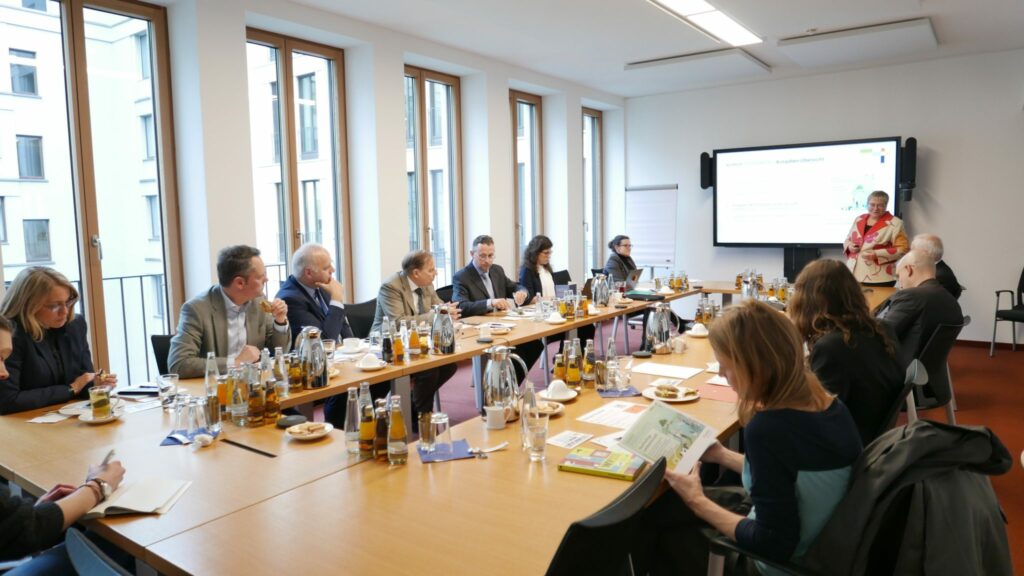
The National Platform Future of Mobility (NPM) also held an evening event for parliamentarians in January at the Auditorium Friedrichstraße venue in Berlin. The event was attended by over 200 guests from government, science and industry. Presentations by Federal Minister of Transport, Andreas Scheuer, and Chairman of the acatech Board of Trustees, Henning Kagermann, focused first and foremost on how to secure Germany’s mobility industry. Following on from this, structural change in the automotive industry was discussed by a panel featuring Klaus Bonhoff, Director-General at the Federal Ministry of Transport, Thilo Brückner of the German Engineering Federation (VDMA), Jörg Hofmann of the IG Metall trade union and Ariane Reinhart of Continental AG.
Henning Kagermann, Chairman of the acatech Board of Trustees and Chair of the NPM steering committee (left), and Federal Minister of Transport, Andreas Scheuer (right), speaking at the National Platform Future of Mobility’s evening event for parliamentarians in Berlin. © NPM
At an “acatech am Dienstag” (acatech on Tuesday) event held in Munich in January, the exact meaning of the term “nudging” and the challenges that it entails were discussed by acatech Member Lucia A. Reisch of the Copenhagen Business School, and Rosi Steinberger, Member of the Bavarian State Parliament and Chair of the Committee on Environment and Consumer Protection. Ms Steinberger cited Germany’s traffic light food labelling system as a good example of nudging.
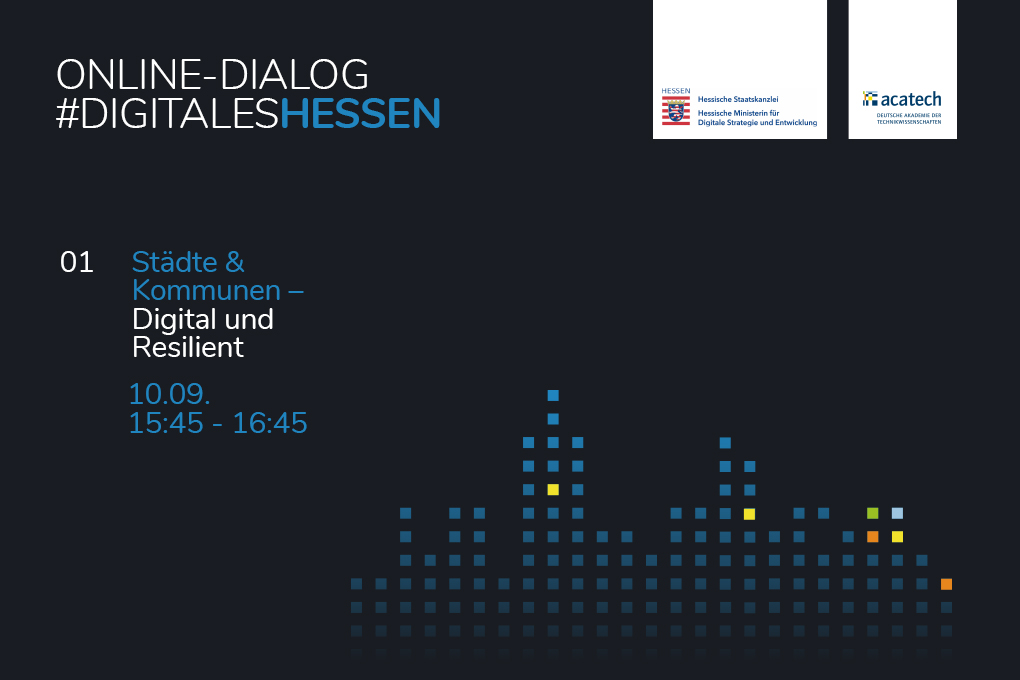
Finally, in the autumn and winter of 2020, acatech and Hesse’s Department of Digital Strategy and Development organised three online discussion events on the increased use of digital technology during the pandemic. In the #DIGITALESHESSEN series, acatech Presidents Karl-Heinz Streibich and Dieter Spath and Hessen’s Minister of Digital Strategy, Kristina Sinemus, discussed three topics with guests from science and industry: the opportunities for creating smart cities and municipalities, digital remote working and the impacts of the coronavirus crisis on the German startup scene.
We are seeing for ourselves that digitalisation offers robust technologies for coping with the crisis in a variety of different areas, such as education, communication, business and public administration.
Kristina SinemusHessen’s Minister of Digital Strategy, at the #DIGITALESHESSEN online discussion event in November 2020
Publications
News items
- Bundestagsabgeordnete diskutieren Biologisierung der Materialforschung *
- acatech diskutiert mit Stakeholdern über Nachhaltige Landwirtschaft *
- Die NPM in der Debatte: Parlamentarischer Abend Sicherung des Mobilitäts- und Produktionsstandorts Deutschland *
- Besseres Verhalten dank Nudging? *
- #DigitalesHessen: Wie Städte und Kommunen die Digitalisierung nutzen *
- #DigitalesHessen: Unternehmen – digital, auf Abstand, produktiv *
- #DigitalesHessen: Corona – Turbo oder Bremsklotz für Startups? *
* content only available in German

© shutterstock/pogonici
Public dialogue events
acatech believes that the best way to provide advice to the public is by engaging in a dialogue. During the coronavirus pandemic, most of its dialogue events were held online. However, despite the difficult circumstances in 2020, acatech continued to facilitate a dialogue on technology-related issues between members of the public, scientists and representatives of government, industry and civil society.
The Academy’s “acatech am Dienstag” (acatech on Tuesday) events have now been running successfully for several years. vhs.wissen live, the knowledge platform of Germany’s further education colleges, provided the ideal partner for 2020’s virtual events. Some of the events, on topics such as “A Culture of Repair”, “AI – When Will the Machines Take Over?” and “Cyber Security: Opportunities and Challenges”, were attended by several hundred people from all over Germany. Participants had the opportunity to put their questions to experts from science, industry, government and civil society.
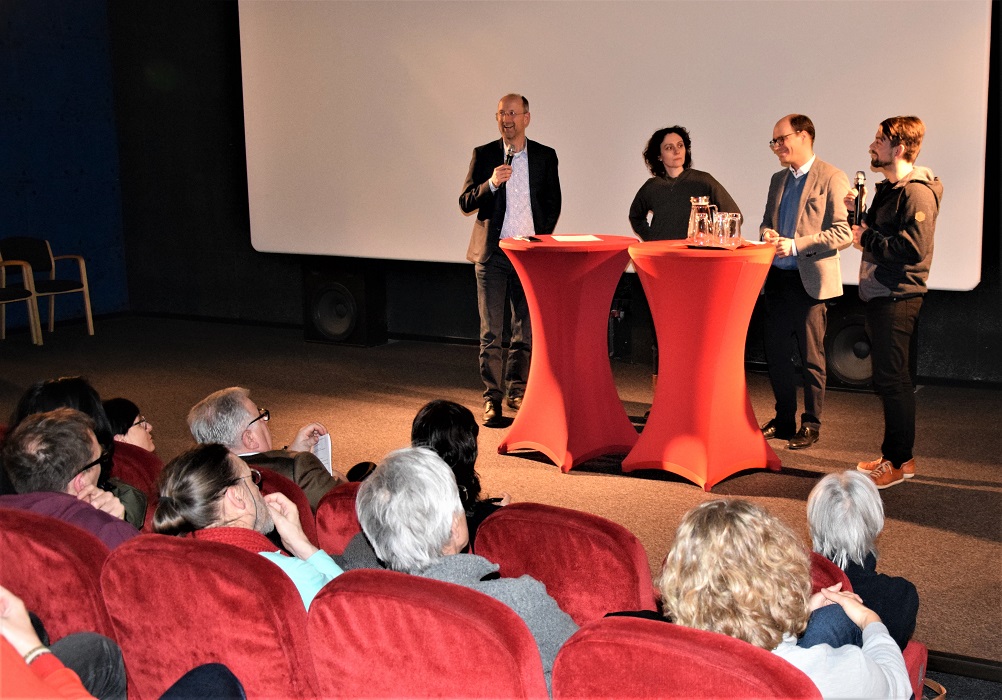
acatech am Dienstag goes to the pictures
Fortunately, one special acatech am Dienstag event could still be held face-to-face. On 4 February, just a few days before the Oscars, Munich’s Monopol cinema hosted a film screening and discussion of the documentary “Hi, AI – Liebesgeschichten aus der Zukunft” (Hi, AI –Love Stories from the Future), which explores the coexistence of humanoid machines and human beings. The screening was followed by an audience discussion with director Isa Willinger, Andreas Heindl (Plattform Lernende Systeme) and Dennis Knobbe (Technical University of Munich).
Strict compliance with the relevant public health regulations made it possible to hold a joint event entitled “Corona als Beschleuniger” (The Coronavirus Pandemic as an Accelerator) at the Akademie für Politische Bildung in Tutzing in early September 2020. acatech President Dieter Spath, acatech Members Ortwin Renn and Dietmar Harhoff, and the Director of the Akademie für Politische Bildung, Ursula Münch, discussed the implications of the pandemic for government, business and society as a whole.
Science Journalism in the Digital Age
In 2020, the importance of science journalism in keeping the public reliably informed was thrown into sharp focus across the globe. Individual scientists reached an audience of millions and became key advisors of government and the general public. At the same time, however, the pandemic exacerbated the already precarious financial predicament of many media companies.
“Science Journalism in the Digital Age” is a project launched by acatech and German science journalists’ association WPK. Funded by the Federal Ministry of Education and Research (BMBF), the project aims to explore how the coronavirus crisis and digitalisation have impacted science journalism and discuss the associated opportunities. From October on, the project organised a series of open, virtual dialogue events with experts from around the world. More information is available at https://science-journalism.eu/eu-scicon-2020/.
In autumn 2020, the Federal Ministry of Education and Research launched #FactoryWisskomm, a project that brings together scientists, science communication experts, journalists and science communication and journalism foundations and organisations. acatech President Karl-Heinz Streibich and Executive Board member Ortwin Renn are acting as the leads of the working group on “Science Journalism in the Digital Age”.
News items
- Filmgespräch bei acatech am Dienstag: Wie sieht das Zusammenleben mit Robotern aus? *
- Weichenstellung 2020 – Schiene zwischen Digitalisierung und Strukturwandel *
- Grüner Neustart der Wirtschaft nach Corona? *
- acatech verleiht Journalistenpreis PUNKT für hervorragende Beiträge über Korrosion und sächsischen Erfinderreichtum *
- Digitale Lehre in Zeiten von Corona *
- Die Kultur der Reparatur *
- Pestizide in der Landwirtschaft: Notwendiger Pflanzenschutz oder Umwelt- und Gesundheitsgefahr? *
- Quantentechnologien – zwischen Forschungsförderung und Wertschöpfung *
- Skepsis in Wissenschaft und Technik *
- Chancen und Herausforderungen der KI *
- Innovationen brauchen Schlüsseltechnologien *
- Sauber und kreativ – wie Energieforschung und Glaskunst zusammen kommen *
- Möglichkeiten und Herausforderungen der Cyber Security *
- Elektroschrott reduzieren, effektiv recyclen und Geschäftsmodelle neu denken *
- Wahrnehmung der Bioökonomie – Es kommt darauf an, was man daraus macht! *
- Corona:Krise:Kommunikation *
- Digitaler Journalismus in Zeiten der Corona-Krise *
- „sauba derbleckt!“ – deazeid digital für dahoam *
- Na denn Prost! – Wie sicher ist unser Trinkwasser? *
- CO2 – Klimakiller oder nützlicher Rohstoff? *
- Plastik, Mikroplastik … unersetzbar, aber unzersetzbar? *
- Innovation durch Umdenken *
- Rückschau: Das Wissenschaftsjahr 2019 – Künstliche Intelligenz *
- Besseres Verhalten dank Nudging? *
- Die Pandemie verändert unseren Umgang mit Technik *
* content only available in German
Organisation
Members
acatech’s Members are leading experts from the fields of engineering, the applied sciences, the humanities, economics and the social sciences. They are invited to join the Academy on the basis of their outstanding scientific achievements and excellent reputation. acatech had a total of 598 Members as of December 2020. This included 36 newly-elected experts from the fields of engineering, the natural sciences, the humanities, economics and the social sciences. In the acatech topic networks, the Academy’s Members collaborate on technical issues relating to the technological sciences and more general technology policy questions.
New ordinary acatech Members in 2020
- Prof. Dr.-Ing. Christine Ahrend
- Prof. Dr. Christoph Becher
- Prof. Dr.-Ing. habil. Jean Pierre Bergmann
- Prof. Dr. Angelika Bullinger-Hoffmann
- Prof. Dr. Andrea Büttner
- Prof. Dr. Tommaso Calarco
- Prof. Dr.-Ing. Barbara Deml
- Prof. Dr.-Ing. Roman Dumitrescu
- Prof. Dr. med. Dr. med. dent. Dr. phil. Dominik Groß
- Prof. Stefan Hecht Ph.D.
- Prof. Dr. Andreas Herkersdorf
- Prof. Dr. Dr. Rafaela Hillerbrand
- Prof. Dr. Thomas Hofmann
- Prof. Dr. Kurt-Jürgen Hülsbergen
- Prof. Dr. Heyo K. Kroemer
- Prof. Dr.-Ing. Dominik Matt
- Prof. Dr.-Ing. Mirko Meboldt
- Prof. Dr.-Ing. Ludger Overmeyer
- Prof. Dr. Franz Pfeiffer
- Prof. Dr.-Ing. Annika Raatz
- Prof. Dr. Dagmar Schäfer
- Prof. Dr. Mike S. Schäfer
- Prof. Dr.-Ing. Robert Schober
- Prof. Dr. Chris-Carolin Schön
- Prof. Dr. Dr. Birgit Spanner-Ulmer
- Prof. Dr. Meike Stiesch
- Prof. Dr. Friedhelm Taube
- Prof. Dr.-Ing. habil. Klaus-Dieter Thoben
- Prof. Dr.-Ing. Martin Vossiek
- Prof. Dr. Michael Waidner
- Prof. Dr. habil. An-Ping Zeng
New associate acatech Members in 2020
- Prof. Dr. Jens Frahm
- Prof. Dr. Rudolf Gross
- Prof. Dr. Dieter Meschede
- Prof. Youming Zhang Ph.D.
- Prof. Dr. rer. nat. habil. Ehrenfried Zschech
acatech Members who passed away
- Prof. Dr.-Ing. Erhard Hornbogen
- Prof. Dr.-Ing. Gunther Schänzer
Senate
acatech’s Senate forms the second pillar of the Academy, alongside the Members. The Senate includes members of technology companies, associations, societies and government, as well as the presidents of the major science organisations. The members of the Senate advise the Academy on strategic issues and channel proposals from industry.
New members of the acatech Senate are elected by its existing members following their nomination by the Executive Board. As of December 2020, acatech’s Senate comprised more than 100 prominent figures from industry, associations, societies, government and science organisations. Five members left the Senate, while no new members were elected due to the coronavirus pandemic.
Members who left the Senate in 2020
- Dr. Günter von Au
- Dr. Andreas Kreimeyer
- Dr. Karsten Ottenberg
- Hauke Stars
- Matthias Zachert
Executive Board and Management Board
acatech’s Executive Board is responsible for the Academy’s strategic management and for representing it externally. Its members are elected from the members of the General Assembly and the Senate, ensuring that the Executive Board represents both pillars of the Academy. The Executive Board includes acatech’s Presidents and Vice-Presidents, as well as its Managing Director and the scientific President’s representative, both of whom serve as non-voting members. Karl-Heinz Streibich has served as one of acatech’s two Presidents since 2018, while Jan Wörner took over from Dieter Spath as the Academy’s other President in March 2021. Michael Schenk also joined the acatech Executive Board in 2020, bringing the total number of members to 20 (18 of whom are voting members) as of 31.12.2020. The Academy’s Management Board is made up of the Executive Board members responsible for acatech’s operational management and comprises the Presidents, Vice-Presidents, Managing Director and scientific President’s representative. Stefan Oschmann and Christoph M. Schmidt were elected to the Management Board in 2020, while Reinhard Ploss also joined from the start of 2021.
New Executive Board members in 2020
- Michael Schenk
Board of Trustees
The acatech Board of Trustees comprises prominent figures from academia, industry, government and civil society. Chaired by Henning Kagermann, it helps the Management Board to determine the Academy’s strategic direction. The acatech Board of Trustees meets at least once a year. In 2020 it had 20 members..
New members of the Board of Trustees in 2020
- Jürgen Großmann
- Dieter Spath (from March 2021)
Secretariat
The acatech Secretariat in Munich is the Academy’s headquarters. It is home to the Academy’s senior management and the majority of its staff in the support, organisation and administration functions, as well as those responsible for specific priority themes. acatech has two offices in Berlin: its main Berlin office and an ESYS project office. The acatech office in Brussels coordinates the Academy’s networking activities at EU level. In 2020, a total of 124 members of staff were employed at acatech’s offices, approximately 65 percent of whom were women. During this period the Academy was also supported by 35 student assistants and one trainee.

© shutterstock/Number1411
Finances
acatech is a non-profit organisation. Its institutional funding is shared equally between the Federal Government and the Länder. This is supplemented by public and private project funding.
Funding
Revenue (million euros)
The acatech Förderverein was established in order to raise funds for the Academy. We would like to thank our funders for their generous contributions, which play a large part in enabling and supporting acatech’s work.
Board of the Förderverein
- Dr.-Ing. h. c. Bernd Pischetsrieder, Chairman of the Board
- Prof. Dr.-Ing. Siegfried Russwurm, Deputy Chairman of the Board
- Manfred Rauhmeier, acatech Managing Director, Board member and Secretary of the Förderverein
Private Funding
Contributions from Förderverein members
- A.T. Kearney GmbH
- ABB AG
- Accenture Dienstleistungen GmbH
- Airbus Group
- Alfred Kärcher GmbH & Co. KG
- Allianz SE
- Atos IT Solutions and Services GmbH
- BASF SE
- Bayer AG
- Beckhoff Automation GmbH & Co. KG
- BMW AG
- Brose Fahrzeugteile GmbH & Co. KG
- Bruker Physik GmbH
- BSH Hausgeräte GmbH
- Carl Zeiss AG
- Daimler AG
- Dassault Systemes Deutschland GmbH
- Datev eG
- Deutsche Bahn AG
- Deutsche Börse AG
- Deutsche Post AG
- Deutsche Telekom AG
- Digitalplus GmbH
- DIN Deutsches Institut für Normung e.V.
- Duisburger Hafen AG
- Dürr AG
- Evonik Industries AG
- ExxonMobil Central Europe Holding GmbH
- Friedhelm Loh Stiftung
- Google Germany GmbH
- Harting Stiftung & Co. KG
- Hitachi Europe Ltd.
- HUAWEI Technologies Duesseldorf GmbH
- IAV GmbH Ingenieurgesellschaft Auto und Verkehr
- IBM Deutschland GmbH
- Infineon Technologies AG
- innogy SE
- Jacobs Foundation
- Jopp GmbH
- K + S AG
- Klöckner & Co SE
- Linde AG
- Merck KGaA
- MHP Management- und IT-Beratung GmbH
- Muhr und Bender KG
- Münchener Rückversicherungs-Gesellschaft
- Otto Fuchs KG
- PSI Software AG
- PricewaterhouseCoopers GmbH
- Robert Bosch GmbH
- SAP SE
- SEW-EURODRIVE GmbH & Co KG
- Sick AG
- Siemens AG
- Siemens Healthcare GmbH
- Sino German Hi Tech Park Holding GmbH + Co. KG
- Software AG
- Stahlinstitut VDEh
- Stifterverband für die Deutsche Wissenschaft e.V.
- TRUMPF GmbH + Co. KG
- TÜV Rheinland Berlin Brandenburg Pfalz e.V.
- TÜV SÜD AG
- UNITY AG
- Viessmann Werke GmbH & Co. KG
- WAGO Kontakttechnik GmbH & Co. KG
- Weidmüller Interface GmbH & Co. KG
- Wittenstein SE
Private Funding
- ALPLA Werke Alwin Lehner GmbH & Co KG
- Bayer Science & Education Foundation
- Beiersdorf AG
- Bertelsmann SE & Co. KGaA
- BMW AG
- Borealis AG
- Clariant International AG
- Covestro Deutschland AG
- Daimler AG
- Deutsche Bahn AG
- Deutsche Börse AG
- Deutsche Lufthansa AG
- Deutsche Post AG
- Deutsche Telekom AG
- E. Merck Beteiligungen KG
- GreenCycle Stiftung & Co. KG
- Henkel AG & Co. KGaA
- Hochland Deutschland GmbH
- Interseroh Dienstleistungs GmbH
- Jacobs, Joh. Christian
- Klaus Tschira Stiftung
- Körber-Stiftung
- Münchener Rückversicherungs-Gesellschaft
- Otto GmbH & Co. KG
- Reverse Logistics GmbH
- Robert Bosch Stiftung
- SAP SE
- Siegwerk Druckfarben AG & Co. KGaA
- Siemens AG
- Siemens Stiftung
- SMS GmbH
- TRUMPF GmbH + Co. KG
- Umicore AG & Co. KG
